#full transcript under cut
Text
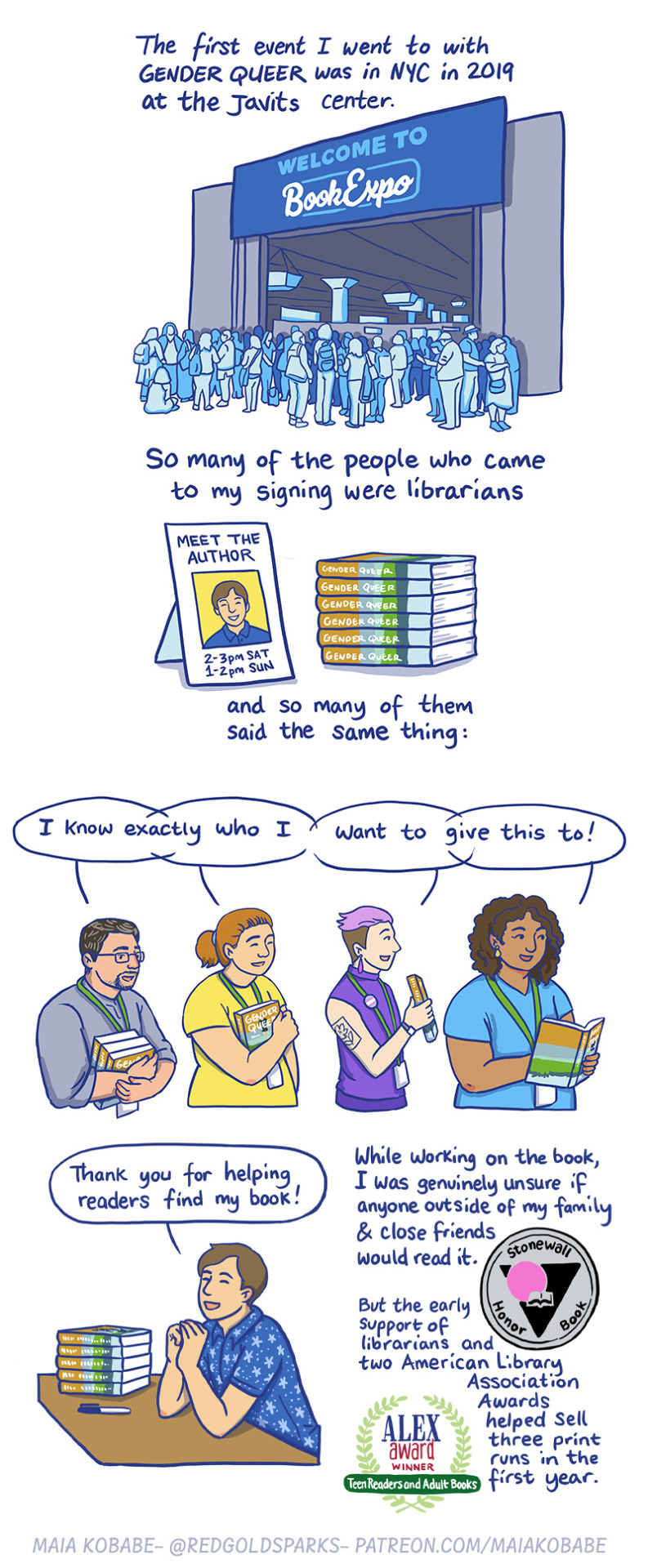
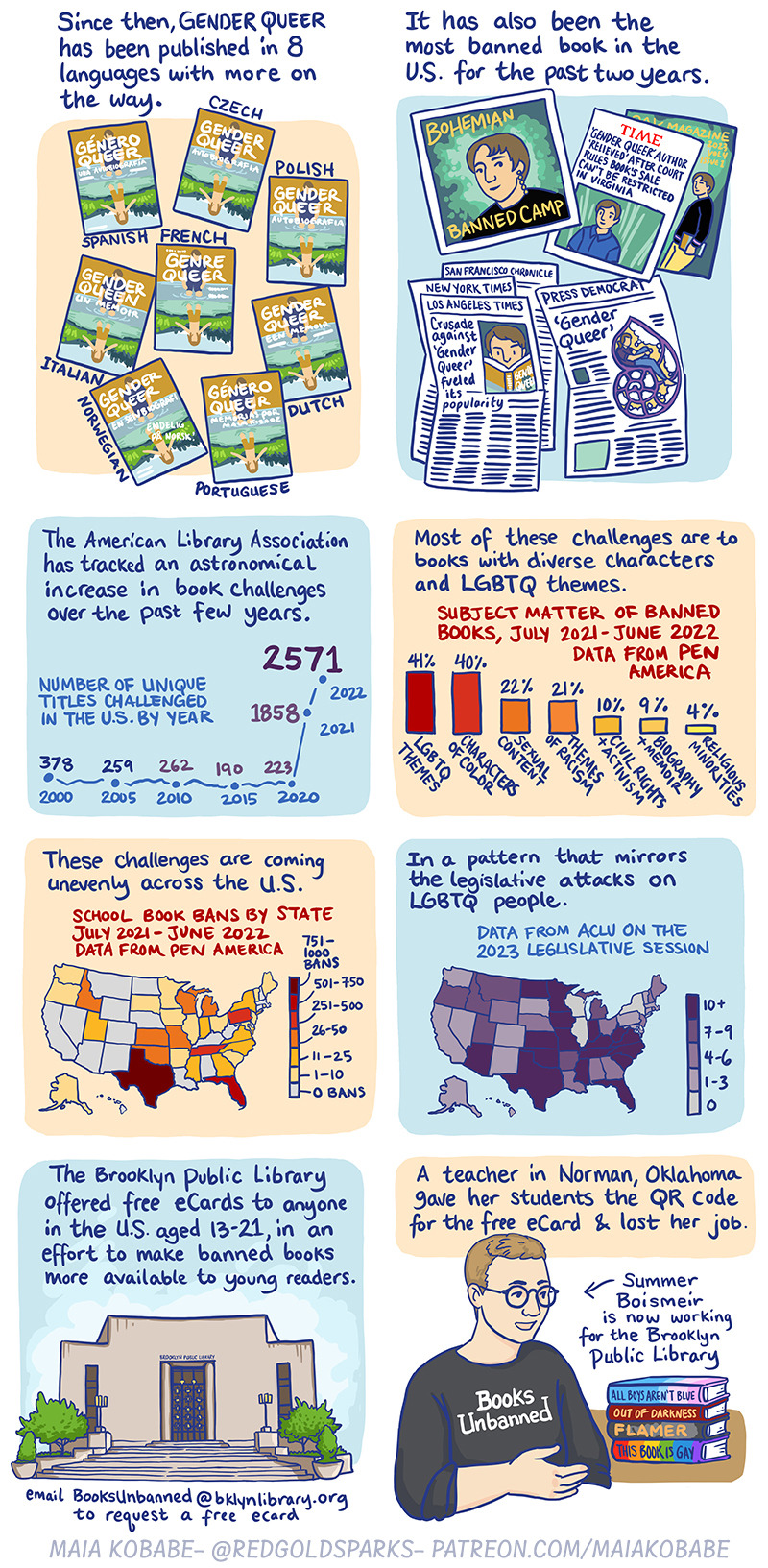
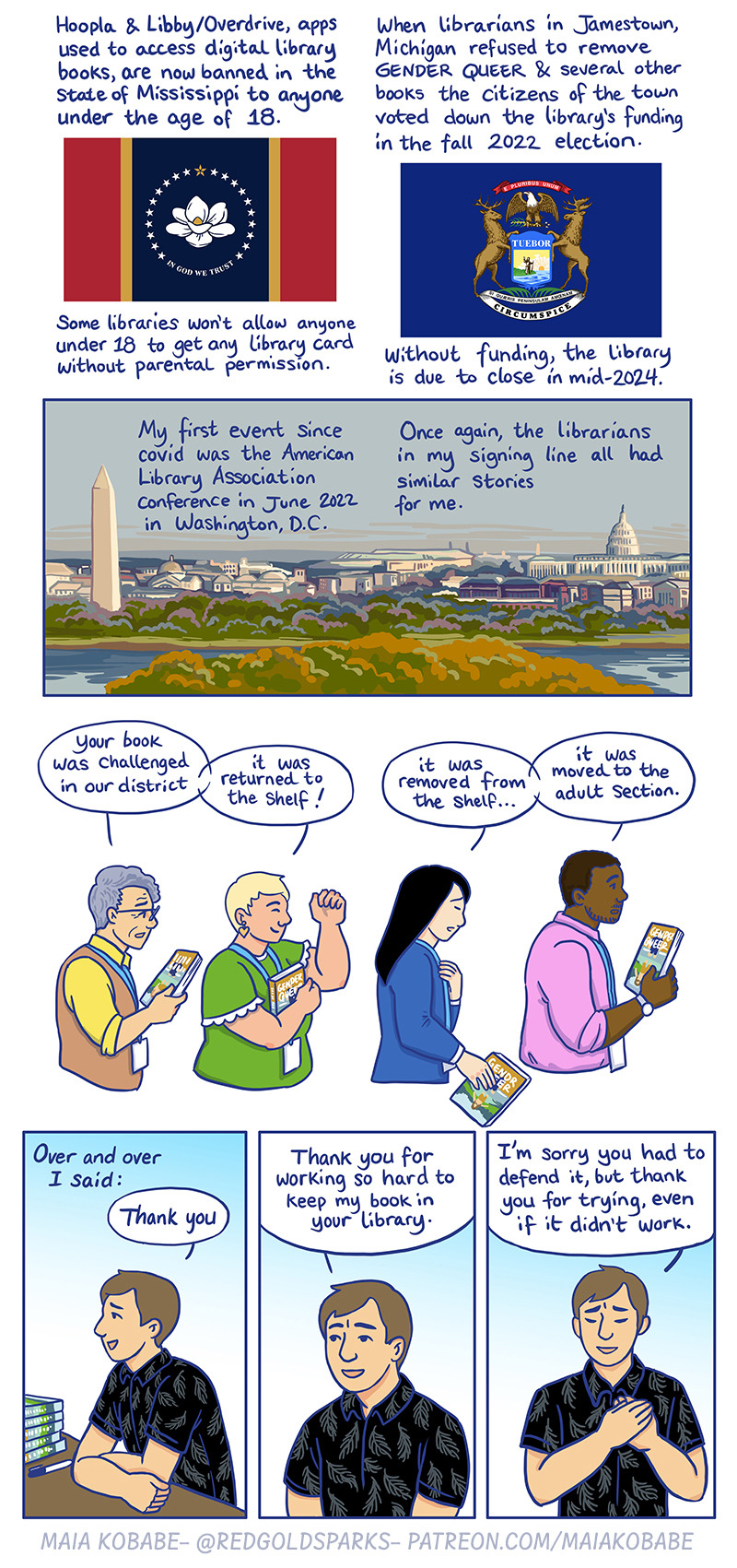
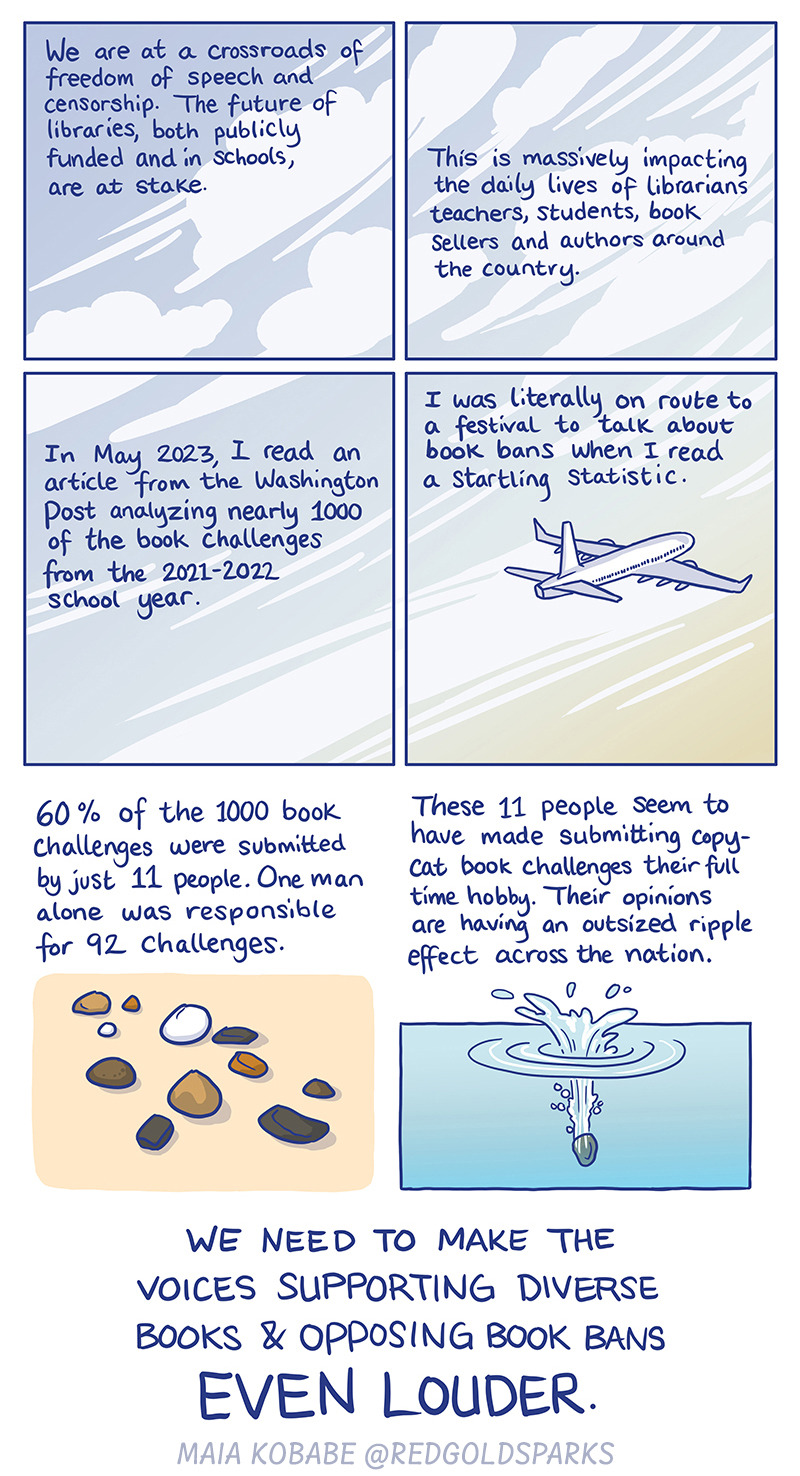
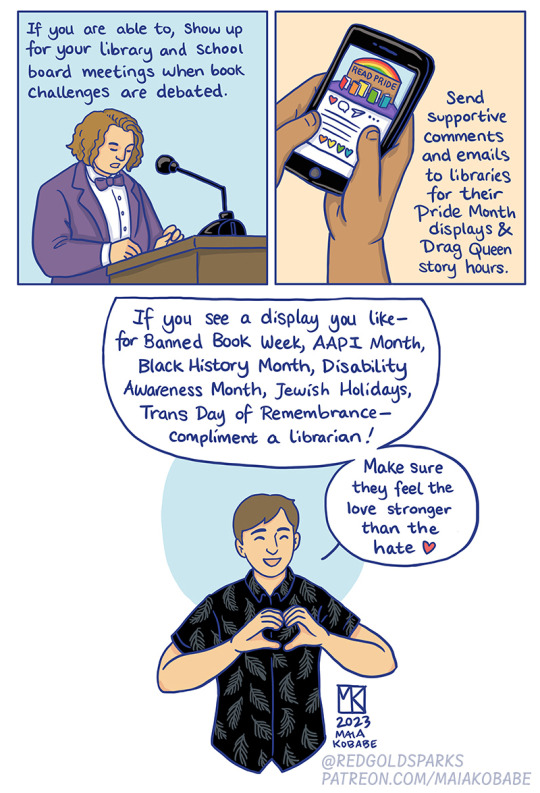
My very last comic for The Nib! End of an era! Transcription below the cut. instagram / patreon / portfolio / etsy / my book / redbubble
The first event I went to with GENDER QUEER was in NYC in 2019 at the Javits Center.
So many of the people who came to my signing were librarians, and so many of them said the same thing: "I know exactly who I want to give this to!"
Maia: "Thank you for helping readers find my book!"
While working on the book, I was genuinely unsure if anyone outside of my family and close friends would read it. But the early support of librarians and two American Library Association awards helped sell two print runs in first year.
Since then, GENDER QUEER been published in 8 languages, with more on the way: Spanish, Czech, Polish, French, Italian, Norwegian, Portugese and Dutch.
It has also been the most banned book in the United States for the past two years.
The American Library Association has tracked an astronomical increase in book challenges over the past few years. Most of these challenges are to books with diverse characters and LGBTQ themes. These challenges are coming unevenly across the US, in a pattern that mirrors the legislative attacks on LGBTQ people.
The Brooklyn Public Library offered free eCards to anyone in the US aged 13-21, in an effort to make banned books more available to young readers. A teacher in Norman, Oklahoma gave her students the QR code for the free eCard and lost her job. Summer Boismeir is now working for the Brooklyn Public Library.
Hoopla and Libby/Overdrive, apps used to access digital library books, are now banned in Mississippi to anyone under 18. Some libraries won’t allow anyone under 18 to get any kind of library card without parental permission.
When librarians in Jamestown, Michigan refused to remove GENDER QUEER and several other books, the citizens of the town voted down the library’s funding in the fall 2022 election. Without funding, the library is due to close in mid-2024.
My first event since covid hit was the American Library Association conference in June 2022 in Washington, DC. Once again, the librarians in my signing line all had similar stories for me: “Your book was challenged in our district"
"It was returned to the shelf!"
"It was removed from the shelf..."
"It was moved to the adult section."
Over and over I said: "Thank you. Thank you for working so hard to keep my book in your library. I’m sorry you had to defend it, but thank you for trying, even if it didn't work."
We are at a crossroads of freedom of speech and censorship. The future of libraries, both publicly funded and in schools, are at stake. This is massively impacting the daily lives of librarians, teachers, students, booksellers, and authors around the country. In May 2023, I read an article from the Washington Post analyzing nearly 1000 of the book challenges from the 2021-2022 school year. I was literally on route to a festival to talk about book bans when I read a startling statistic.
60% of the 1000 book challenges were submitted by just 11 people. One man alone was responsible for 92 challenges. These 11 people seem to have made submitting copy-cat book challenges their full-time hobby and their opinions are having an outsized ripple effect across the nation.
WE NEED TO MAKE THE VOICES SUPPORTING DIVERSE BOOKS AND OPPOSING BOOK BANS EVEN LOUDER.
If you are able too, show up for your library and school board meetings when book challenges are debated. Send supportive comments and emails about the Pride book display and Drag Queen story hours. If you see a display you like– for Banned Book Week, AAPI Month, Black History Month, Disability Awareness Month, Jewish holidays, Trans Day of Remembrance– compliment a librarian! Make sure they feel the love stronger than the hate <3
Maia Kobabe, 2023
The Nib
19K notes
·
View notes
Photo
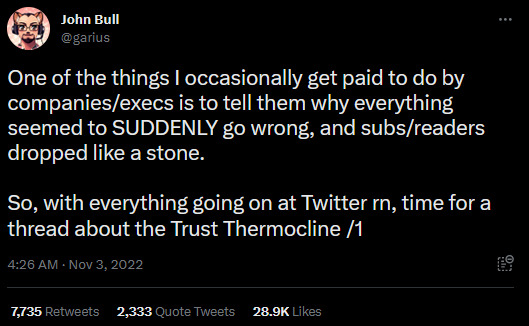

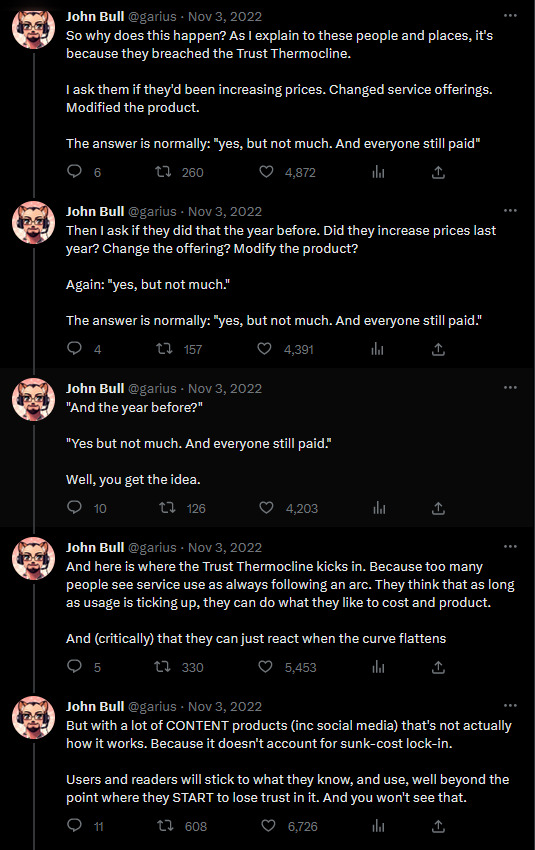
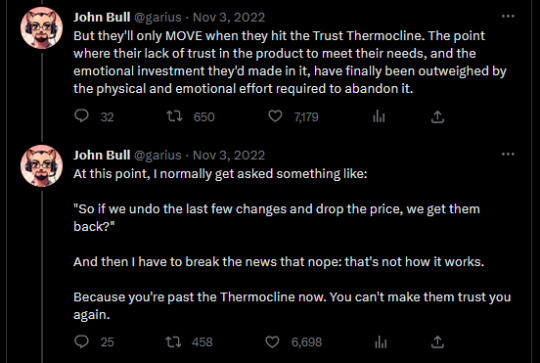
Really good Twitter thread originally about Elon Musk and Twitter, but also applies to Netflix and a lot of other corporations.
Full thread. Text transcription under cut.
John Bull @garius
One of the things I occasionally get paid to do by companies/execs is to tell them why everything seemed to SUDDENLY go wrong, and subs/readers dropped like a stone. So, with everything going on at Twitter rn, time for a thread about the Trust Thermocline /1
So: what's a thermocline?
Well large bodies of water are made of layers of differing temperatures. Like a layer cake. The top bit is where all the the waves happen and has a gradually decreasing temperature. Then SUDDENLY there's a point where it gets super-cold.
That suddenly is important. There's reasons for it (Science!) but it's just a good metaphor. Indeed you may also be interested in the "Thermocline of Truth" which a project management term for how things on a RAG board all suddenly go from amber to red.
But I digress.
The Trust Thermocline is something that, over (many) years of digital, I have seen both digital and regular content publishers hit time and time again. Despite warnings (at least when I've worked there). And it has a similar effect. You have lots of users then suddenly... nope.
And this does effect print publications as much as trendy digital media companies. They'll be flying along making loads of money, with lots of users/readers, rolling out new products that get bought. Or events. Or Sub-brands.
And then SUDDENLY those people just abandon them.
Often it's not even to "new" competitor products, but stuff they thought were already not a threat. Nor is there lots of obvious dissatisfaction reported from sales and marketing (other than general grumbling). Nor is it a general drift away, it's just a sudden big slide.
So why does this happen? As I explain to these people and places, it's because they breached the Trust Thermocline.
I ask them if they'd been increasing prices. Changed service offerings. Modified the product.
The answer is normally: "yes, but not much. And everyone still paid"
Then I ask if they did that the year before. Did they increase prices last year? Change the offering? Modify the product?
Again: "yes, but not much."
The answer is normally: "yes, but not much. And everyone still paid."
"And the year before?"
"Yes but not much. And everyone still paid."
Well, you get the idea.
And here is where the Trust Thermocline kicks in. Because too many people see service use as always following an arc. They think that as long as usage is ticking up, they can do what they like to cost and product.
And (critically) that they can just react when the curve flattens
But with a lot of CONTENT products (inc social media) that's not actually how it works. Because it doesn't account for sunk-cost lock-in.
Users and readers will stick to what they know, and use, well beyond the point where they START to lose trust in it. And you won't see that.
But they'll only MOVE when they hit the Trust Thermocline. The point where their lack of trust in the product to meet their needs, and the emotional investment they'd made in it, have finally been outweighed by the physical and emotional effort required to abandon it.
At this point, I normally get asked something like:
"So if we undo the last few changes and drop the price, we get them back?"
And then I have to break the news that nope: that's not how it works.
Because you're past the Thermocline now. You can't make them trust you again.
56K notes
·
View notes
Text

Outside Washington, D.C., studio, before Youth Wants to Know got underway, a few students cornered Burt to ask, "Do you think certain of our movies encourage juvenile delinquency?" Burt paused, thoughtfully lit a cigarette, and said, "I'd like a moment to think about that."
Please Tell Us, Mr. Burt Lancaster. . .
— PHOTOPLAY MAGAZINE DECEMBER, 1957
Twenty high school students were lucky enough, recently, to interview Burt Lancaster, who is currently breaking box office records as the star of his own film, Sweet Smell of Success. And the teens broke a record of their own. "It was one of the toughest interviews I've been put through," Burt admitted at the end. The questions ran through everything from sex and censorship to the high price of the neighborhood movie and Marilyn Monroe. There wasn't a dull moment.
STUDENT: Sir, does the average American moviegoer's preference for films dealing with crimes, sex and violence indicate that he cannot appreciate more refined acting and drama? I've wondered about this.
MR. LANCASTER: No, I don't think that is necessarily true. I think you will find most people go to movies for purposes of relaxation, and they like to see things on the screen that cause visual excitement but that don't particularly disturb or distress them too much or make them think too hard.
STUDENT: In other words, intellectual movies would not appeal to the average American moviegoer?
MR. LANCASTER: To the average American moviegoer, no, I would say.
STUDENT: In this light, do you feel that you are debasing yourself when you are acting, just to satisfy American moviegoers' cravings and likes?
MR. LANCASTER: No, I think you have responsibilities to the likes and dislikes of people. What we as a group have to try to do in the making of movies is to make those that will appeal to a large, mass audience. We must also try to make movies that will appeal to, shall we say, a smaller and minority group. And as long as we maintain our own standards of what we like, we will find we can make pictures that can appeal to all peoples. Not all the time, though.
STUDENT: Mr. Lancaster, as a producer, would you tell me this: When you choose a picture, do you choose one that is popular with the American public even though you personally feel that story is not too good?
MR. LANCASTER: Not always. Well, no, we would never choose a picture if we felt the story is not too good; that is, if it doesn't have the basic ingredients of what would represent drama and entertainment to people.
STUDENT: Mr. Lancaster, do you feel that movies such as "The Man with the Golden Arm" gives Europeans the wrong impression of America?
MR. LANCASTER: I don't think any picture gives European people a wrong impression of America if it is well made and made with honesty and integrity as to the subject matter.
STUDENT: Well, do you think such movies encourage juvenile delinquency here in the United States?
MR. LANCASTER: I think juvenile delinquency is not encouraged by movies, specifically. I think juvenile delinquency is encouraged by unfortunate economic conditions and conditions in homes where children don't have a proper upbringing because, very often, of those conditions.
STUDENT: Sir, we know now there are a lot of foreign actors and actresses over the United States. Do you think the American public seems to like these people much better than their own people, those they see all the time?
MR. LANCASTER: No. This brings up the question of what makes really a star performer. American people and, of course, European people and people all over the world, for that matter, like the performer who has that unique personality and quality which appeals to them personally. It has nothing to do with the fact that they are, shall we say, of foreign extraction, I don't think.
STUDENT: Do you feel foreign films are going to make any great inroads into the habits of the American movie-going public?
MR. LANCASTER: I think time has proven at least that foreign films as such do appeal only to a limited group of Americans. Again, it goes back to the original question that was asked earlier. One of the reasons is that American people as such are more comfortable with a subject matter that pertains to things that they particularly understand. Foreign people talk with accents that are very hard to understand. Very often, they have a very grim and brutal kind of realism which a great many American people do not like to see, since they do not have any identification with the problems. These are some of the reasons foreign films are not especially successful in a broad sense in the American cinematic world.

Moderator Steve McCormick nodded to a boy in the front row, who demanded, Mr. Lancaster, how do actors and producers react to censorship groups?" The girl next to him wanted to know, "Do Americans like foreign films and stars more than our own?"
STUDENT: I am interested in knowing why you think western films should be done necessarily with fun and action.
MR. LANCASTER: It isn't that they necessarily should; and a peculiar thing happens in movies. You see, there have been pictures like "High Noon," for instance, which have been highly successful. On the other hand, there have been pictures like the one I made with Gary Cooper called "Veracruz," which by critical standards does not measure up to a "High Noon," but which is a much more satisfying picture from the point of view of entertainment. There is also another problem: When you make a film of a special nature that will appeal to limited groups of people, you have to face the fact that these films are not in the broad sense of the word, popular. Therefore, when you do them, you must be careful that you do them for a certain price, because you have a limited income on such films, and the first cardinal rule of making pictures or writing a play or any form of entertainment is to make something that is financially successful. If they are not successful, you don't continue in business, and you have no opportunity to present the ideas that you think are unique or even artistic.
STUDENT: How does Hollywood face competition between TV and movies?
MR. LANCASTER: What Hollywood has attempted to do about it is this: Actually, it is my personal opinion that the advent of TV, as far as Hollywood is concerned, has been a very, very healthy thing. There was a time, about ten short years ago, when almost anything that came out of Hollywood could be assured of reasonable financial success. Naturally, this sort of lulled people into a sense of false security, and there was not a great deal of attempt on the part of the studios to try to do anything worthwhile and different and challenging. Now that great inroads have been made in the whole financial structure of Hollywood, they have realized they have to do better things, things that are more exciting, more challenging so that people will leave their television receivers and come out to look at them.
STUDENT: Sir, I have read you do not attend many Hollywood social functions. Don't you like the type of people at these functions?
MR. LANCASTER: Oh, yes. It has nothing to do with the functions. It is just that I have a group of friends that I would prefer to be with. For example, my wife and I like to play bridge. I have never been particularly comfortable or at ease in large social functions, cocktail parties, and so forth.
STUDENT: Would you ever encourage your own children to go into acting if they wanted to?
MR. LANCASTER: I would certainly do it. I feel a child should have an opportunity to do anything he has an inclination toward.
STUDENT: Do yours watch you when you are performing in movies?
MR. LANCASTER: Yes, and they're among my toughest critics. They have traveled with me all over the world while I was making movies. They have lived in the Fiji Islands for four months and attended school there, they attended school in Mexico City, they have lived in France for the summer and they have lived in Italy for six months when I was there making a picture. But now they have reached the age where it is very difficult for them to go with me because they go to school. They have certain ties there, so I try to arrange my program so if I am shooting on location, it occurs in the summertime so I can take them with me.
STUDENT: Mr. Lancaster, you mentioned a few minutes ago about the entertainment of movies, and that is why people go to movies, to be entertained. But it seems to me a juvenile delinquency film or a film on corruption in life, the baseness in life, would be rather not too entertaining.
MR. LANCASTER: Let me make clear what I mean by entertaining. Every movie that is made has a point of view, whether it is a good one, a bad one, a useful one or what. By entertainment, I mean that regardless of what the subject matter may be, it should have an entertainment quality to it. That does not mean that the subject should not be treated with great seriousness, and great depth and great definition.
STUDENT: I was wondering if the type of film such as "On the Waterfront," where you can come out fighting mad and want to clean up the waterfront, has the purpose of reforming. Or "Baby Doll."
MR. LANCASTER: Well, about "Baby Doll," I would quarrel with you. But certainly on "On the Waterfront" I agree with you.
STUDENT: Most of your films are hard-bitten, often violent, dramas. Do you object to your children seeing them?
MR. LANCASTER: Here is what I try to do. I let my children see the films that I am in. Some of them—for instance, "Come Back Little Sheba," which I think is a worthwhile picture in addition to being an entertaining one are difficult for their immature minds to understand completely. But rather than have them not see it, if they ask to see it, I let them, but I make sure to see it with them so I can try to answer all the questions they might raise. Therefore, I hope I can give them some sense of security about it, even those matters they might not particularly understand.
I would like to cite an example of just that. My little boy asked yesterday to see "Sweet Smell of Success," which is also a very hard-bitten picture and not what you would normally call children's fare. I said, "Well, Jimmie, that is fine; you can see the picture. But I don't think you will like it. Why do you want to see it?"
"Well," he said, "I'd like to see it, Daddy, because you're in it."
"That is fair enough," I said, "but I don't think you will understand it." And he answered, "I may not understand it, but that doesn't mean I won't like it."
STUDENT: Mr. Lancaster, what is the reaction of producers to censorship groups?
MR. LANCASTER: As you probably know, there is no official censorship problem in the movies in the United States or any official censorship at all. This is not so in England, where they do have an official government censorship, and can refuse you a license to show a picture. In short, they have a police force that can stop you from showing the picture. There is the Johnson office which has its headquarters here in Washington, and is a self-imposed censorship by the industry.
It is known as the MPPA—Motion Picture Producers Association. Their attitude is this: They say to the producers, "In order to protect the morality of the nation as it might be affected by motion pictures, if you will let us see the scripts you are going to make, we will attempt, not to censor, mind you, what you are trying to say, but attempt to guide you in matters of how to handle these problems as best you can."
Now, of course, it always comes to the question of who are the people who are going to decide this, how knowledgeable are they, do they know better than the actual creators of the motion picture?
What has happened is that in recent years (and I think this a very healthy thing) the MPPA has been forced to recognize—perhaps not forced but has willingly recognized—the fact that enormous advances have been made in the general education of the American public and, therefore, the subjects which were considered taboo before are now permitted.
So what has happened is this: The old code has been enormously changed. The whole attitude of the so-called censor board has improved a great deal. We do now show pictures in which words like "abortion" and "prostitution" are mentioned, and in which we discuss divorce problems, and then, of course, there is the matter of narcotics, which was recently brought up in several pictures. The picture "Hatful of Rain" now has been approved by the board, where before the "Man with the Golden Arm" was not approved. It looks like things are looking up in the censorship problem.
STUDENT: I would like to know, would you agree with some critics who say that Jayne Mansfield and Marilyn Monroe have acting talents equal to their more obvious appeals?
MR. LANCASTER: Well, I don't know what the critics feel about it. That is their opinion. One of the things I would like to be made clear about movies again it goes back to the business of being a star: The most unique thing a motion picture actor or actress can have is an outstanding or peculiar personality of some kind. And these girls certainly have some outstanding qualities that appeal to people visually, at least. Those are the elements most important in the making of a motion picture star. Not necessarily the acting ability as such. On the other hand, to be a good actor, to be an exciting personality on the screen, of course, is that much better.
STUDENT: Who is the most beautiful woman you have ever acted with?
MR. LANCASTER: They were all beautiful. I am just quoting my lines from "The Rainmaker." "They are all beautiful in a different way."
STUDENT: I want to know what your wife thinks about your performing in movies and having these torrid love scenes with Hollywood leading ladies.
MR. LANCASTER: The torrid love scene you have with a Hollywood leading lady is, from our point of view while we are in the process of making it, "work." You have a job. You are creating an illusion for an audience to see, and the only assurance I think that my wife has is that she knows I love her, and that is about all I can say on that subject.
STUDENT: I am interested in knowing why you didn't change your name when you started acting. Most actors and actresses do.
MR. LANCASTER: As a matter of fact, I did want to change my name. They were going to give me the name of an economist, Stewart Chase. They decided this by numerology. Then a gentleman by the name of Mark Hellinger, who is now dead, and who produced the first picture I was in, "The Killers," said to me, "Is Burt Lancaster your real name?"
I said, "Yes."
He said, "What's wrong with that?" I said, "Nothing." He said, "Let's use it." I said, "O.K."
STUDENT: Sir, because of television, do you think that the pictures now coming out might break down some of the prices that these theatres have? In other words, producing prices and everything?
MR. LANCASTER: You think the prices are too high?
STUDENT: Well, yes.
MR. LANCASTER: I know this has been a subject of great discussion among distributors, because I have also been in that end of the business since my pictures are distributed and exhibited. The feeling is they try to keep the economic level of prices and pictures as low as possible since it is, first of all, a traditional thing and the people who generally support the pictures are not those who have a great deal of money, normally speaking.
I will gladly say this: The distribution groups would gladly put a picture up for a nickel tomorrow if the cost of production would permit them.
There is no desire on their part to try to cheat the public. Sometimes pictures are so expensive they have to charge certain prices in order to get any kind of income from them.
"This has been one of the most provocative questioning sessions I've ever gone through. Our young people are really serious about motion pictures," said Burt as time ran out and the interview came to a close. "Anyone who says American teenagers are delinquents is all wet. I am grateful to the National Broadcasting Company's 'Youth Wants to Know,' and the National Education Association for bringing us together today."
THE END
#full interview under the cut or read it at the source :^)#his perspective as an indie producer during this period of filmmaking is super interesting#youth wants to know#photoplay magazine#<- transcript was published there but this was on tv#interview#article#1957#television
0 notes
Text


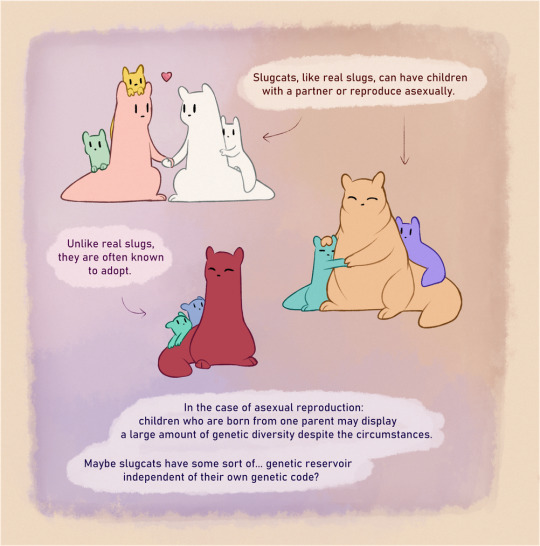
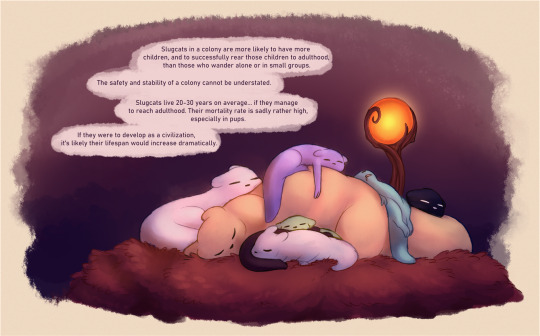
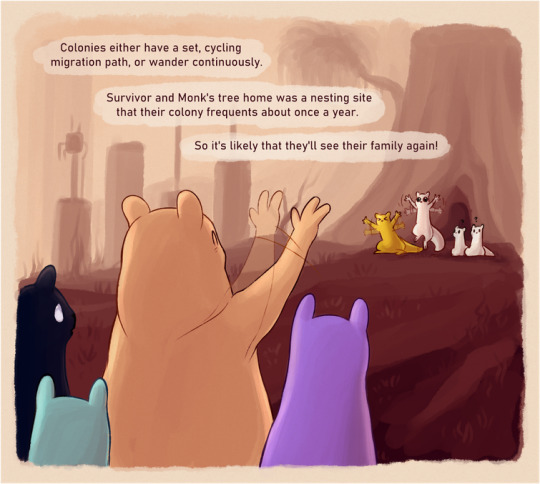


Playing with some ideas mostly regarding gender/reproduction in RW, and slugcat colonies.
Full transcript under the cut!
Creatures in Rain World are typically simultaneous hermaphrodites but require partners to reproduce, with either individual capable of being a genetic donor or carrier. Alongside what we are familiar with, this has lead to interesting reproductive strategies such as rotating donor/carrier roles, or dual/simultaneous genetic swaps.
Rotating donor/carrier roles - A K-selection reproductive strategy. One partner carries the first child, the other partner carries the next child, and so forth. Allows each partner to recover from the demands of childbearing.
Rain Deer aren't quite monogamous, but they tend to choose the same breeding partner whenever mating season rolls around. They serve as a donor one season, then bear and raise a child the next. Calves are raised away from the rain and worm grass, in places that have less food but more safety. Calf wool is softer, not yet gunked up by the dirty rainfall. Their legs are sturdier as children, allowing them to run for cover while the parent wards off threats.
Dual/simultaneous genetic swap - An r-selection reproductive strategy. Parents fulfill the donor and carrier role for each other. The more children you make, the more likely some are to survive!
Multiple batflies lay thousands of eggs in a single "blue fruit." Several eggs congeal and become nutrient paste for the surviving eggs (and for hungry slugcats). Like some plant seeds, batfly eggs that are consumed before pupating can survive passing through the digestive system. Ew.
Ancients also fell under this umbrella. Their genders (and the genders of iterators by extension, who have no sex anyways) could have been determined by a variety of other factors, such as societal role, donor/carrier preference, or simply different categorizations of personal expression.
It's difficult to say how well their common pronouns would translate to ours, but it seems they can translate to an extent, given what Moon and Pebbles use canonically.
Slugcats, like real slugs, can have children with a partner or self-fertilize. Unlike real slugs, they are often known to adopt.
In the case of self-fertilization: children who are born from one parent may display a large amount of genetic diversity despite the circumstances. Maybe slugcats have some sort of... genetic reservoir independent of their own genetic code?
Slugcats live 20-30 years on average... if they manage to reach adulthood. Their mortality rate is sadly rather high, especially in pups. If they were to develop as a civilization, it's likely their lifespan would increase dramatically.
Slugcats in a colony are more likely to have more children, and to successfully rear those children to adulthood, than those who wander alone or in small groups. The safety and stability of a colony cannot be understated.
Colonies either have a set, cycling migration path, or wander continuously. Survivor and Monk's tree home was a nesting site that their colony frequents about once a year. So it's likely that they'll see their family again!
...also, the strength of large colonies are why scavengers are likely to become the dominant species. In the time of Saint's era, continuous migration has become more of a risk, and it has become more difficult to support large populations. Slugcat populations have shrunk back to the more forgiving equatorial zones.
Saint's tongue is pretty unusual and probably unique to them, or to a small population that they hail from. Fur (of varying thickness) is much more common.
Meanwhile, scavengers are bulkier and covered in thicker insulating fur. They:
have seemingly massive populations
have a burgeoning society (the existence of merchants, tolls, bartering, elites and leaders)
are adept at communicating (non-verbally)
manipulate their environment
can build structures (scavenger-made structures were a scrapped idea from Saint's campaign)
can create complex weapons and tools
may have agriculture behind the scenes (unsure if scout parties prioritize exploration or hunting)
I would wager on scavengers developing more quickly than slugcats, but it would be nice if there was a future where both could co-exist.
#oops! impromptu rendering practice!#rotating donor/carrier roles could also be an r-selection strat#but i feel like it'd be more common as a k-selection strat#rain world#worldbuilding#headcanons#flickerdoodles#art#um#ask to tag?#that goes for all of my posts#rw spoilers#dp spoilers#saint spoilers#long post
2K notes
·
View notes
Text
A bit about Chuanqingren, one of the unofficial ethnic groups in China.
English added by me :)
Full video transcript below the cut:
Simply because these people are so rare, on cellphones and computers, there is no option to choose them. There’s no way to input them as an option.
As a result, often times when they go out, they will be questioned over having a fake ID. They’re not Miao, nor are they Han. And they’re certainly not any of the other 56 ethnic groups. In the 90s, they were designated as an unrecognised ethnic group (official designation). Their group is classified as Other. According to Ming Dynasty historical records, in earlier times, they were called “tu ren” (dirt people), “Li minzi” (~descendants of villagers), and also “xianmin”(羡) or “xianmin”(县) (~county people). Because their traditional clothing tends to be qing* colored (*may describe blue, green, or black), they’ve since been known as “chuanqing ren” (qing-wearing people). Early on, in the 1980s, there was already the write-in option of “qing group”. The first generation of resident IDs have “qingzu” printed on them.
Later, after many years of ethnic group discernment work, it was concluded that for the time being, they did not conform to China’s independent ethnic group determination standards. Therefore, they became recognised as “Chuanqingren”. Chuanqingren are mostly found in the northwest regions of Guizhou province. They use mandrills as their totem and their clothing tends to be qing. The qing color in question is a rather deep blue, one that near black.
There ware several explanations for the origins of Chuanqing people. One saying is that they are indigenous people of Guizhou. Another, more common explanation is that in the early Ming Dynasty, Yunnan’s king of Liang rebelled and Zhu Yuanzhang (Hongwu Emperor) dispatched 300k forces to consolidate the south. Then from south of the Changjiang, many immigrated to Guizhou and settled.
Historically it’s known as “transfer from the north, filling the south”, and Chuanqingren are simply the later generations of these soldiers and officers and immigrants to the south.
Now then the question comes: why are they only Chuanqing “people”, and not qing “ethnic group” or Chuanqing “ethnic group”?
Firstly, each ethnic group in our country has its own cultural/civilisation origins. For example, the Han ethnic group are the descendants of the Yellow Emperor and Flame Emperors. Therefore, they are also called “Yan Huang Zisun”(descendants of the Flame and Yellow Emperor).
Take for example the Miao ethnic group as well: The origins of the Miao ethnic group is that Chiyou led them in the alliance of the 9 Li tribes.
But Chuanqingren can’t find their origins. Most still simply say that they are a branch of the Han ethnic group. None of their special folk styles and customs have been completely preserved, including their language, which fewer and fewer of them are able to speak. Their clothing is even less common, which has led many to think that the clothing of the Tunpu people (another Han branch) of Anshun are that of Chuanqing people. As a result, many have taken Tunpu people as Chuanqing people.
In China, there are a lot of unique communities not within the 56 [official] ethnic groups. For example, the Mosuo people, the Kemu people, the Xia’erba people, the A’ke people, the Deng people, and more. The so-called “unrecognised” ethnic groups aren’t to say that their group’s identity can’t be distinguished. Rather, it’s that they still don’t meet our country’s criteria for judging independent ethnic groups. So, it’s only in order to reflect and affirm these unique communities that they are incorporated under the "not yet recognised” ethnic group.
In the multi-ethnic household of China, no matter which ethnic group, we all have a common name, and that is ”zhonghua minzu” (the people/nation of China). Do you identify with that? (Do you agree?)
1K notes
·
View notes
Text
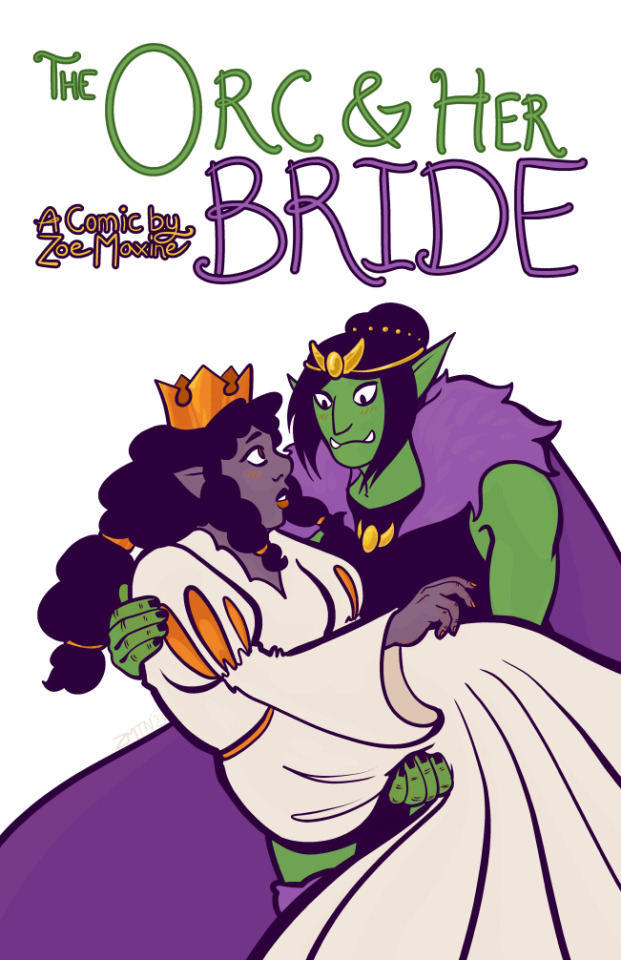
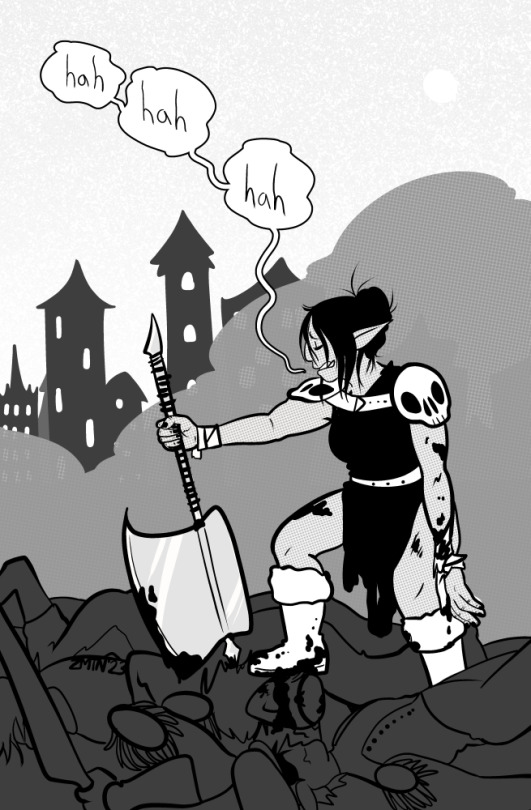
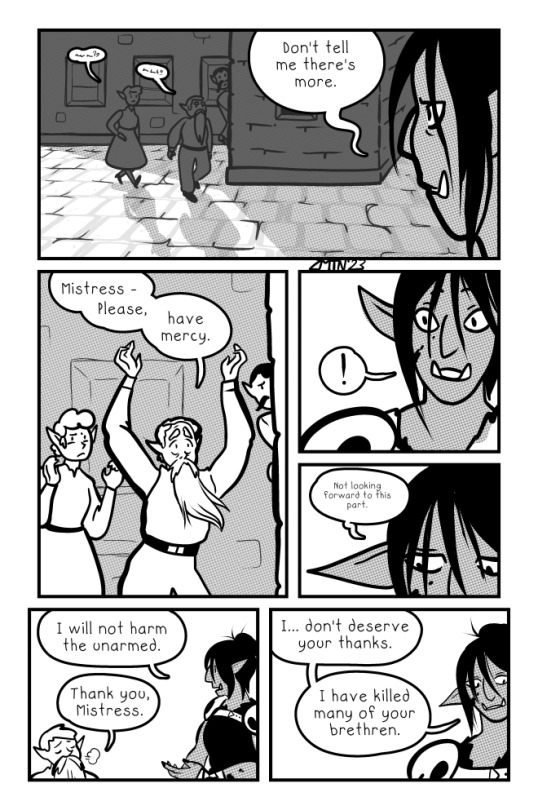



[Full comic transcript under cut in addition to the alt text.]
So I've been working on a short comic, and here's a preview of the first five pages and the cover. They still need some cleanup and editing, and the rest of the pages of course, but I hope you enjoy them!
Images:
First is a cover, in greens, oranges and purples. Title: The Orc and Her Bride, A Comic by Zoe Maxine. The illustration shows a surprised orc woman in a fancy cape and circlet holding an equally surprised dark skinned elf woman in a creamy bridal dress and crown.
Page 1. Full page drawing of the orc woman, looking far more ramshackle, covered in blood on a pile of bodies, and holding a giant axe. She pants with exhaustion.
Page 2. She looks over to see three people murmuring around a nearby building.
Orc: "Don't tell me there's more."
The three pointy eared people approach, looking frightened.
Bearded man with his hands raised: "Mistress - Please, have mercy."
The Orc is shocked, before she looks down, muttering, "Not looking forward to this part."
Looking at the bearded fellow she says, "I will not harm the unarmed."
Sighing, the bearded man says, "Thank you, Mistress."
Avoiding his eyes, the orc says, "I don't deserve your thanks. I have killed many of your brethren."
Page 3. Two of the people exchange a look between them, faces neutral.
Bearded one: "…Our soldiers, yes."
The other, an older woman with short hair, looks at the orc. "Mistress, where do you come from?"
Bearded one: "Why have you done this?"
A shadow passes over the orc's face. "I am from Eskerfort."
The next panel shows her saying "And… because I am from Eskerfort." over a flashback to her kneeling on the ground, defeated, in front of burning houses with soldiers barely visible in the background.
The two people in the present look away, almost ashamed, saying "Ah," with understanding.
Page 4. Looking down at the bodies below her, the orc says, "I am tired of bloodshed. I have avenged my kin. I will darken your doorways no more and leave you in peace."
As she turns to leave, however, the beareded one rushes forward. "Wait! Worrier! Stop! Please!"
The elfin woman looks up at her, asking, "Do you not know our laws?"
Together the two try to point out something to the orc. "Look, please!" "Look!"
Among the bodies is a fancily dressed one wearing a circlet.
Off-panel, the people say, "That one you killed among the dead - he was our king."
One of them reaches down to grab the circlet.
Page 5: Looking concerned, the orc woman says, "Are you asking me to be executed? For Regicide?"
As the elfin woman is doing something, the bearded one puts his hands on his hips and looks up sternly. "No, Warrior, we are asking you to take responsibility."
The elfin woman holds the circlet up to the orc. It shines. "Our laws are clear," she says, "Whoever kills the king becomes the new king."
The orc stares ahead, eyes becoming pinpricks. "What?"
The next panel has her dressed in a fur lined cape with the circlet on her head, her hair being brushed. She has the exact same expression on her face. "what?"
The last panel has her sitting at the head of a long table with all the elfin people enjoying themselves around her. "what"
4K notes
·
View notes
Text
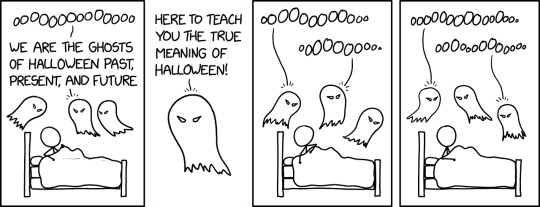
[after a minute] "Okay, I think I've got it, thanks. Can I--" "oOOOooOOooo!"
A Halloween Carol [Explained]
Transcript Under the Cut
[Cueball is half sitting up in bed, his lower body underneath the blankets. He is looking at three ghosts flying above him.]
Middle ghost: ooOOOOOooOOOoo [The "ooooo" of the ghosts is written in wavy letters of varying sizes]
Middle ghost: We are the ghosts of halloween past, present and future
[Just the middle ghost] Ghost: here to teach you the true meaning of halloween!
[Back to the full scene]
Left ghost: ooOOOOOOOooo
Middle ghost: ooOOOOOooo
[Again, the full scene]
Left ghost: ooooooOOOooOooo
Right ghost: ooOoooOOOoooo
#xkcd#xkcd 2836#a halloween carol#webcomics#halloween#fall#hallowe'en#autumn#a christmas carol#ghosts
1K notes
·
View notes
Text
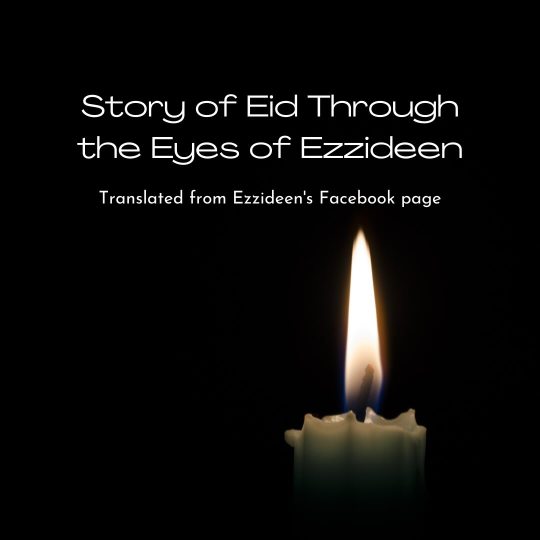




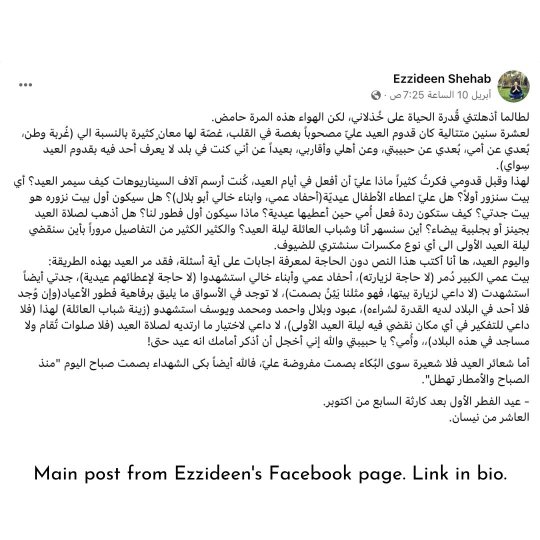
ezzideen's recounting of eid during the genocide, translated and put together by boshra. all sides have alt text and full transcript under the cut.
link to ezzideen's facebook page / donate to ezzideen's campaign
slide 1: A picture of a lit candle in the darkness.
Title: Story of Eid Through the Eyes of Ezzideen
Translated from Ezzideen's Facebook page
slide 2: For ten consecutive years, the arrival of Eid brought a lump to my throat, a lump with many meanings for me (exile from my country, being away from my mother, my beloved, and my family and relatives, in a country where no one else knew of Eid's arrival but me). Before coming here, I thought long and hard about what I should do during the Eid days. I imagined thousands of scenarios: How would Eid pass?
slide 3: Which house would we visit first? Should I give out Eidi (gifts to children, like my uncle's grandchildren and my cousin Abu Bilal's children)? Would the first house we visit be my grandmother's? How would my mother react when I give her the Eidi? What would be our first breakfast? Should I go to the Eid prayer in jeans or in traditional clothes? Where would I and the young men of the family spend Eid night? And many, many more details, from where we would spend the first night of Eid to what kind of nuts we would buy for the guests.
slide 4: And today, on Eid day, here I am writing this text without needing to know answers to any questions, because Eid has passed like this: My big uncle's house was destroyed (no need to visit it), my uncle's grandchildren and my cousin's children have died (there is no one to give Eidi to), my grandmother also has died (no reason to visit her house, as it suffers in silence as we do), there is nothing in the markets fitting for the luxury of an Eid breakfast (and if found, no one in the country can afford it),
slide 5: Abboud, Bilal, Ahmed, Mohammed, and Yusuf were killed (the adornment of our family's youth) so there is no need to think about where to spend the first night of Eid, no need to choose what I wear for the Eid prayer (as no prayers are held and no mosques are in this country), and my mother? My beloved, I am ashamed to even mention to you that it is Eid! As for the rituals of Eid, there is no ritual but to cry in imposed silence, for even God wept silently for the martyrs this morning as the rain fell.
slide 6: Screenshot of a post from Ezzideen's Facebook page.
Caption: Main post from Ezzideen's Facebook page. Link in bio.
348 notes
·
View notes
Text
The Oral History of Take This To Your Grave – transcription under the cut
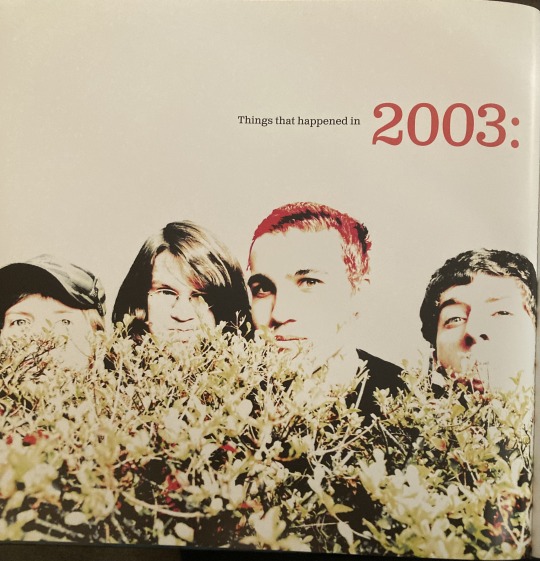
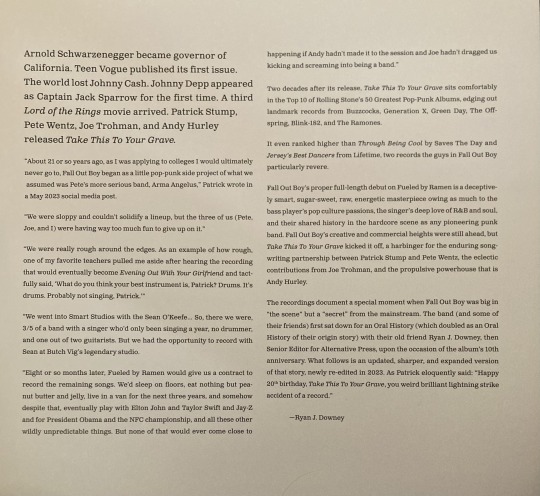
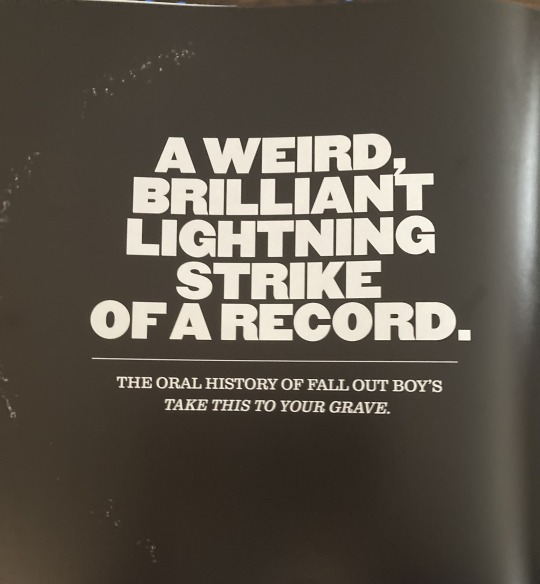
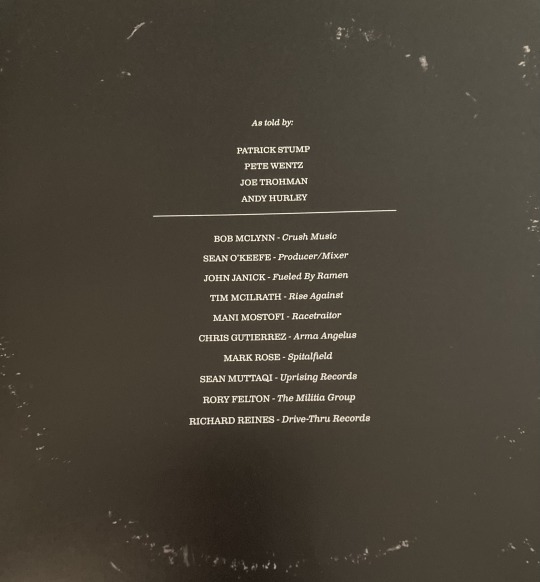
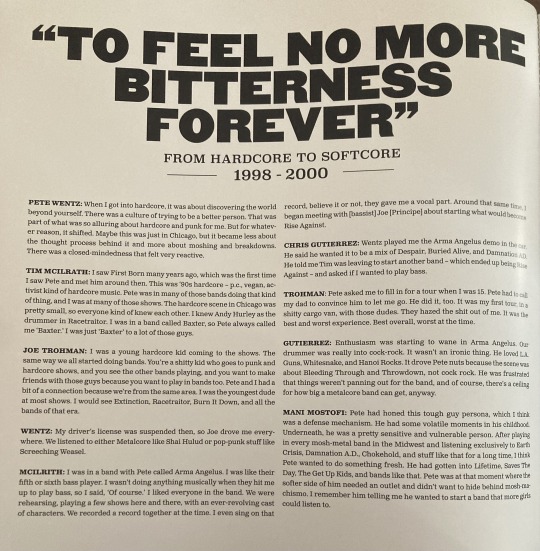
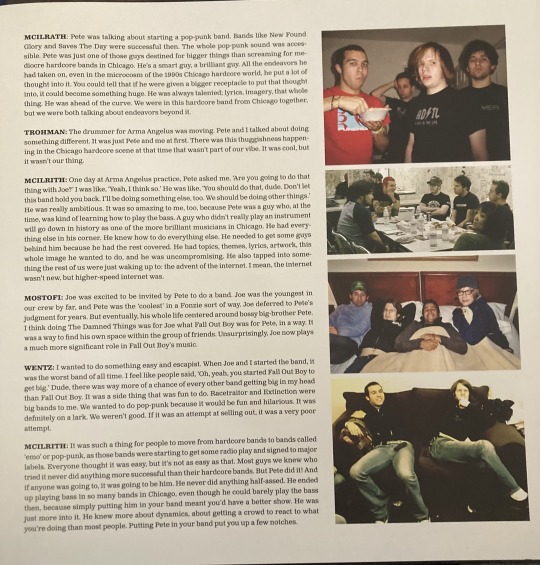

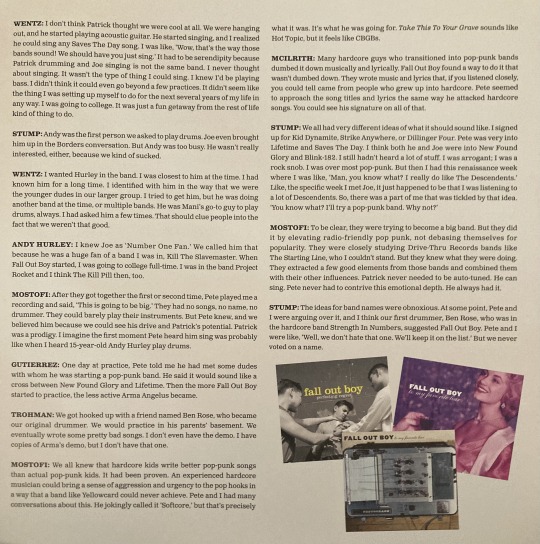
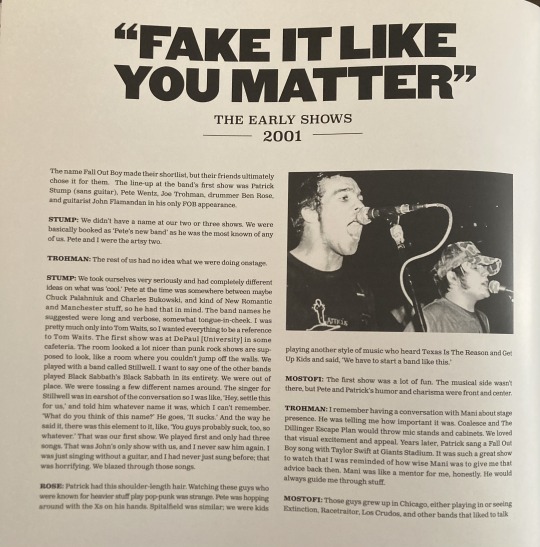
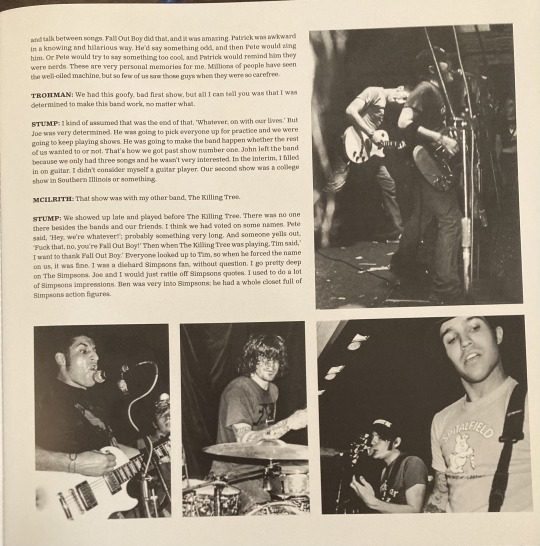
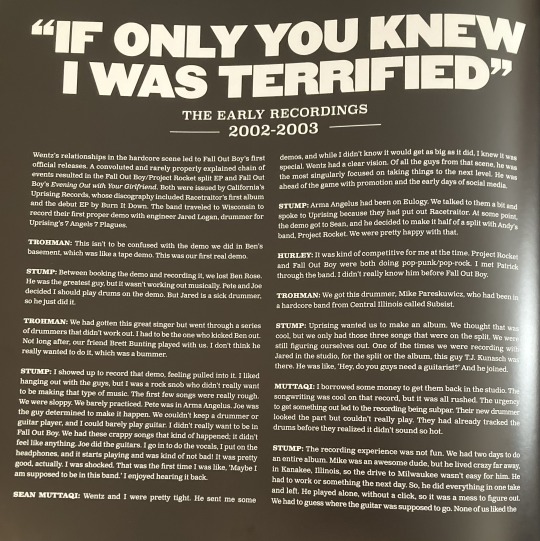
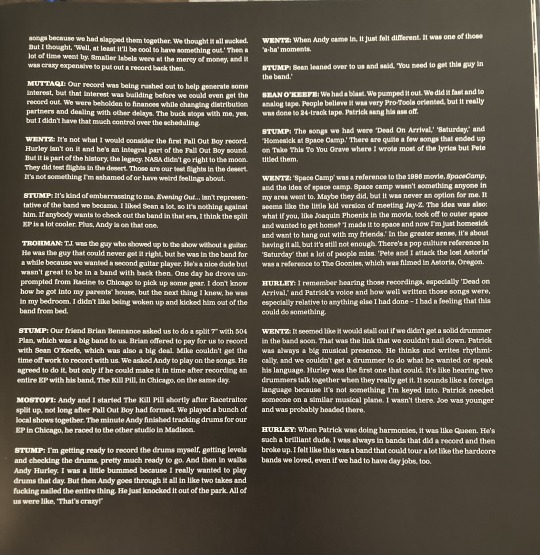
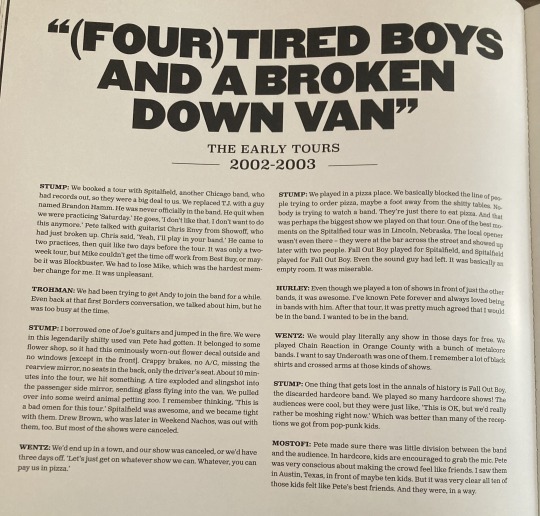
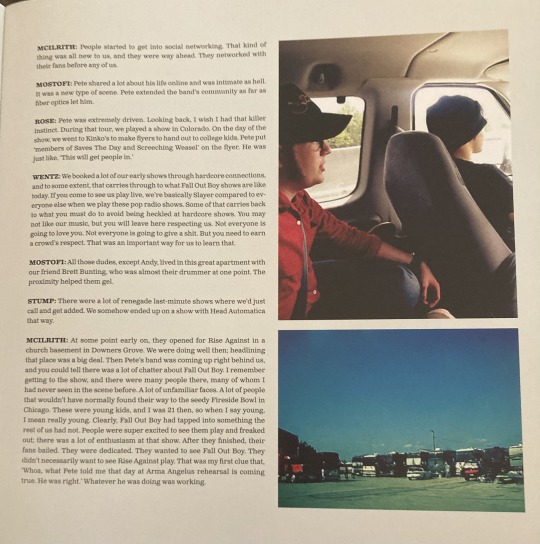
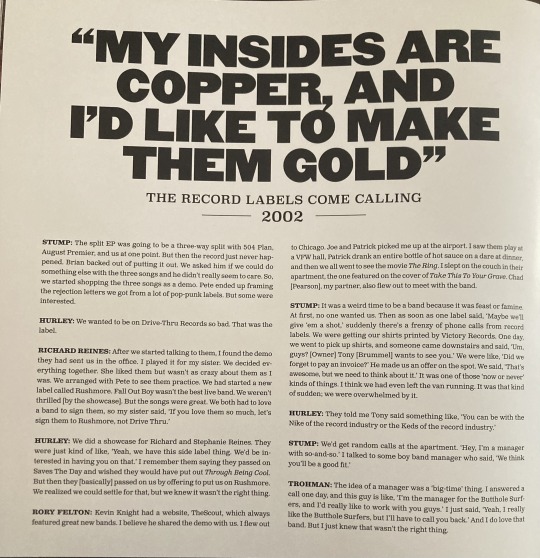
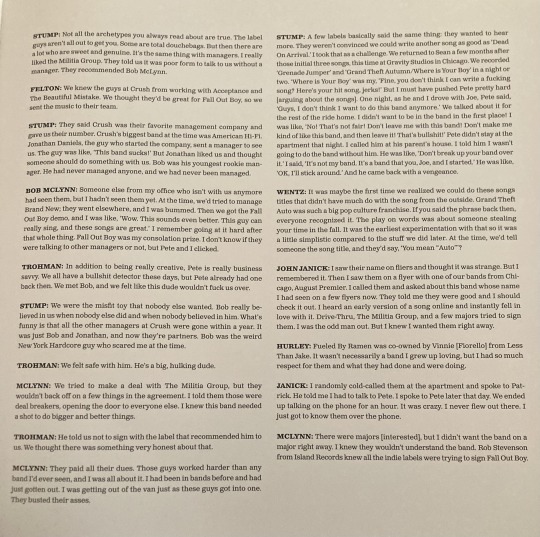
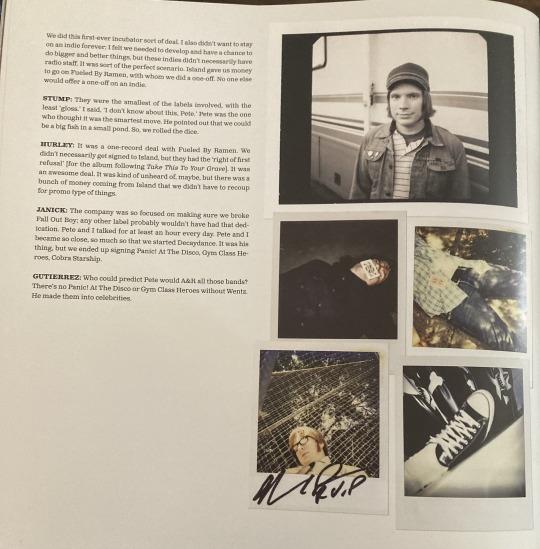
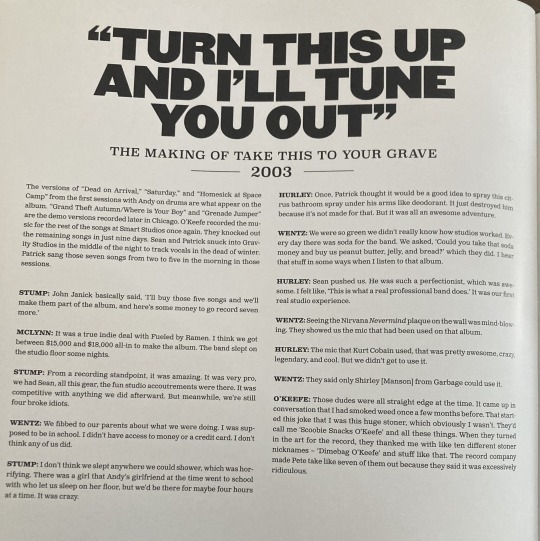
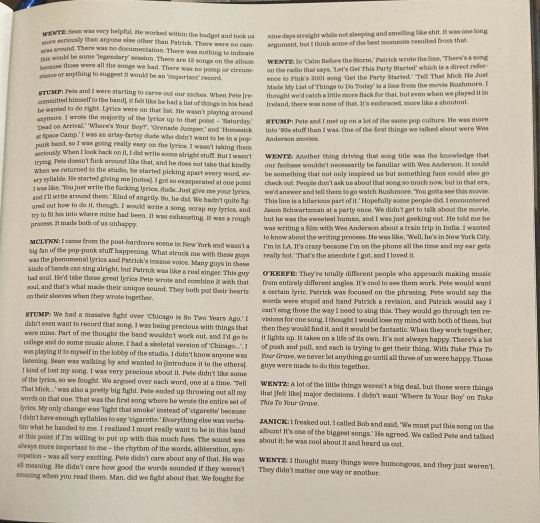
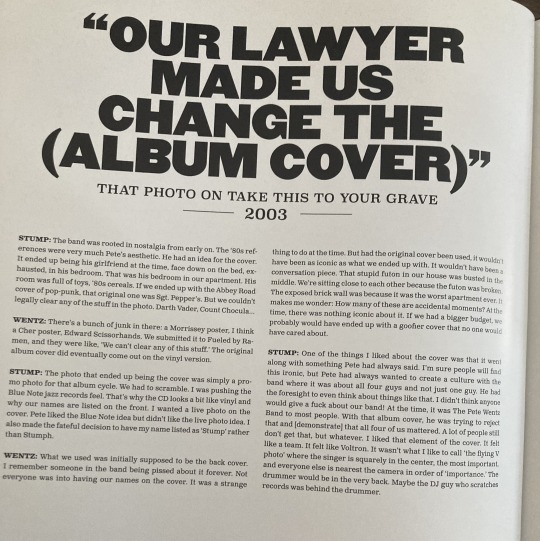
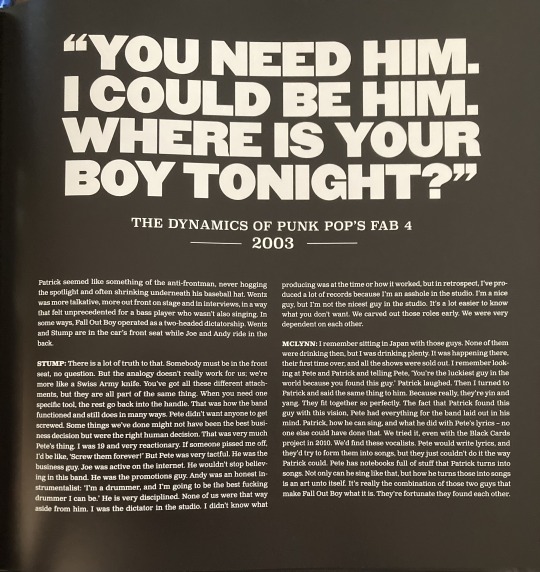
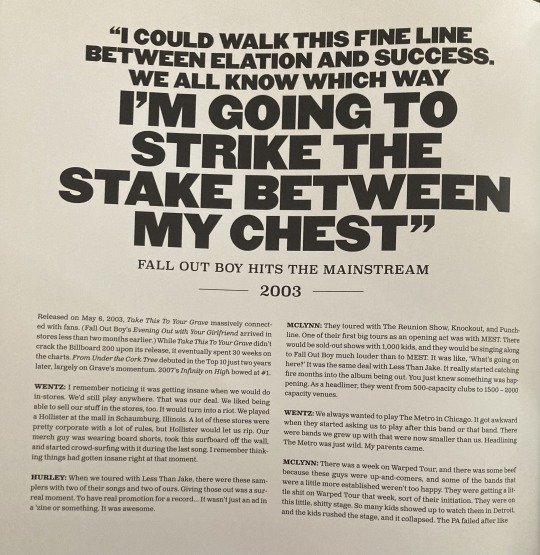
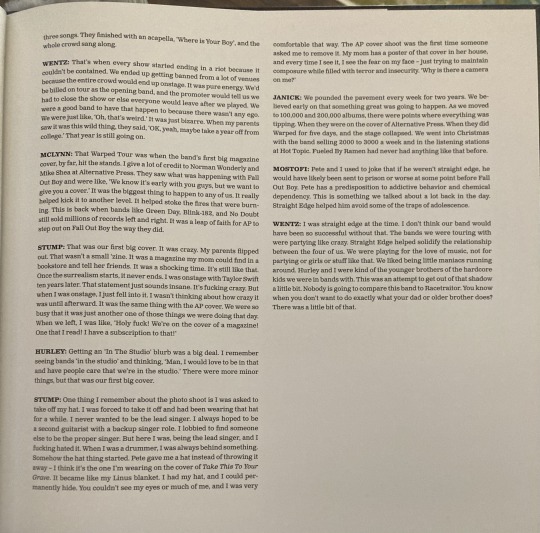
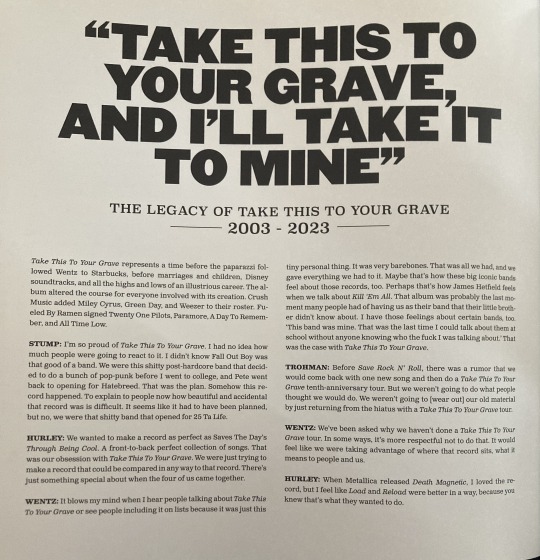
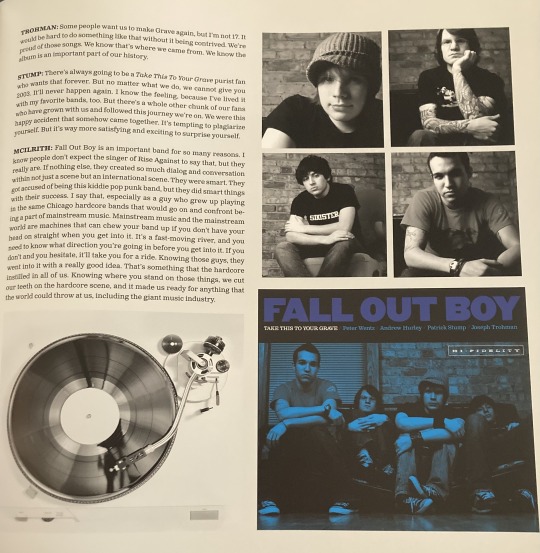
The pages that are just photographs, I haven't included. This post is already long enough.
Things that happened in 2003: Arnold Schwarzenegger became governor of California. Teen Vogue published its first issue. The world lost Johnny Cash. Johnny Depp appeared as Captain Jack Sparrow for the first time. A third Lord of the Rings movie arrived. Patrick Stump, Pete Wentz, Joe Trohman, and Andy Hurley released Take This To Your Grave.
"About 21 years ago or so, as I was applying to colleges I would ultimately never go to, Fall Out Boy began as a little pop-punk side project of what we assumed was Pete's more serious band, Arma Angelus," Patrick wrote in a May 2023 social media post.
"We were sloppy and couldn't solidify a lineup, but the three of us (Pete, Joe, and I) were having way too much fun to give up on it."
"We were really rough around the edges. As an example of how rough, one of my favorite teachers pulled me aside after hearing the recording that would eventually become Evening Out With Your Girlfriend and tactfully said, 'What do you think your best instrument is, Patrick? Drums. It's drums. Probably not singing, Patrick.'"
"We went into Smart Studios with the Sean O'Keefe... So, there we were, 3/5 of a band with a singer who'd only been singing a year, no drummer, and one out of two guitarists. But we had the opportunity to record with Sean at Butch Vig's legendary studio.
"Eight or so months later, Fueled by Ramen would give us a contract to record the remaining songs. We'd sleep on floors, eat nothing but peanut butter and jelly, live in a van for the next three years, and somehow despite that, eventually play with Elton John and Taylor Swift and Jay-Z and for President Obama and the NFC championship, and all these other wildly unpredictable things. But none of that would ever come close to happening if Andy hadn't made it to the session and Joe hadn't dragged us kicking and screaming into being a band."
Two decades after its release, Take This To Your Grave sits comfortable in the Top 10 of Rolling Stone's 50 Greatest Pop-Punk Albums, edging out landmark records from Buzzcocks, Generation X, Green Day, The Offspring, Blink-182, and The Ramones.
It even ranked higher than Through Being Cool by Saves The Day and Jersey's Best Dancers from Lifetime, two records the guys in Fall Out Boy particularly revere.
Fall Out Boy's proper full-length debut on Fueled by Ramen is a deceptively smart, sugar-sweet, raw, energetic masterpiece owing as much to the bass player's pop culture passions, the singers deep love of R&B and soul, and their shared history in the hardcore scene as any pioneering punk band. Fall Out Boy's creative and commercial heights were still ahead, but Take This To Your Grave kicked it off, a harbinger for the enduring songwriting partnership between Patrick Stump and Pete Wentz, the eclectic contributions from Joe Trohman, and the propulsive powerhouse that is Andy Hurley.
The recordings document a special moment when Fall Out Boy was big in "the scene" but a "secret" from the mainstream. The band (and some of their friends) first sat down for an Oral History (which doubled as an Oral History of their origin story) with their old friend Ryan J. Downey, then Senior Editor for Alternative Press, upon the occasion of the album's 10th anniversary. What follows is an updated, sharper, and expanded version of that story, newly re-edited in 2023. As Patrick eloquently said: "Happy 20th birthday, Take This To Your Grave, you weird brilliant lightning strike accident of a record."
– Ryan J. Downey.
A Weird, Brilliant Lightning Strike Of A Record. The Oral History Of Fall Out Boy's Take This To Your Grave.
As told by:
Patrick Stump
Pete Wentz
Joe Trohman
Andy Hurley
Bob McLynn - Crush Music
Sean O'Keefe - Producer/Mixer
John Janick - Fueled By Ramen
Tim McIlrath - Rise Against
Mani Mostofi - Racetraitor
Chris Gutierrez - Arma Angelus
Mark Rose - Spitalfield
Sean Muttaqi - Uprising Records
Rory Felton - The Militia Group
Richard Reines - Drive-Thru Records
"To Feel No More Bitterness Forever" - From Hardcore to Softcore, 1998-2000
PETE WENTZ: When I got into hardcore, it was about discovering the world beyond yourself. There was a culture of trying to be a better person. That was part of what was so alluring about hardcore and punk for me. But for whatever reason, it shifted. Maybe this was just in Chicago, but it became less about the thought process behind it and more about moshing and breakdowns. There was a close-mindedness that felt very reactive.
TIM MCILRITH: I saw First Born many years ago, which was the first time I saw Pete and met him around then. This was '90s hardcore - p.c., vegan, activist kind of hardcore music. Pete was in many of those bands doing that kind of thing, and I was at many of those shows. The hardcore scene in Chicago was pretty small, so everyone kind of knew each other. I knew Andy Hurley as the drummer in Racetraitor. I was in a band called Baxter, so Pete always called me 'Baxter.' I was just 'Baxter' to a lot of those guys.
JOE TROHMAN: I was a young hardcore kid coming to the shows. The same way we all started doing bands. You're a shitty kid who goes to punk and hardcore shows, and you see the other bands playing, and you want to make friends with those guys because you want to play in bands too. Pete and I had a bit of a connection because we're from the same area. I was the youngest dude at most shows. I would see Extinction, Racetraitor, Burn It Down, and all the bands of that era.
WENTZ: My driver's license was suspended then, so Joe drove me everywhere. We listened to either Metalcore like Shai Hulud or pop-punk stuff like Screeching Weasel.
MCILRITH: I was in a band with Pete called Arma Angelus. I was like their fifth or sixth bass player. I wasn't doing anything musically when they hit me up to play bass, so I said, 'Of course.' I liked everyone in the band. We were rehearsing, playing a few shows here and there, with an ever-revolving cast of characters. We recorded a record together at the time. I even sing on that record, believe it or not, they gave me a vocal part. Around that same time, I began meeting with [bassist] Joe [Principe] about starting what would become Rise Against.
CHRIS GUTIERREZ: Wentz played me the Arma Angelus demo in the car. He said he wanted it to be a mix of Despair, Buried Alive, and Damnation A.D. He told me Tim was leaving to start another band - which ended up being Rise Against - and asked if I wanted to play bass.
TROHMAN: Pete asked me to fill in for a tour when I was 15. Pete had to call my dad to convince him to let me go. He did it, too. It was my first tour, in a shitty cargo van, with those dudes. They hazed the shit out of me. It was the best and worst experience. Best overall, worst at the time.
GUTIERREZ: Enthusiasm was starting to wane in Arma Angelus. Our drummer was really into cock-rock. It wasn't an ironic thing. He loved L.A. Guns, Whitesnake, and Hanoi Rocks. It drove Pete nuts because the scene was about Bleeding Through and Throwdown, not cock rock. He was frustrated that things weren't panning out for the band, and of course, there's a ceiling for how big a metalcore band can get, anyway.
MANI MOSTOFI: Pete had honed this tough guy persona, which I think was a defense mechanism. He had some volatile moments in his childhood. Underneath, he was a pretty sensitive and vulnerable person. After playing in every mosh-metal band in the Midwest and listening exclusively to Earth Crisis, Damnation A.D., Chokehold, and stuff like that for a long time, I think Pete wanted to do something fresh. He had gotten into Lifetime, Saves The Day, The Get Up Kids, and bands like that. Pete was at that moment where the softer side of him needed an outlet, and didn't want to hide behind mosh-machismo. I remember him telling me he wanted to start a band that more girls could listen to.
MCILRATH: Pete was talking about starting a pop-punk band. Bands like New Found Glory and Saves The Day were successful then. The whole pop-punk sound was accessible. Pete was just one of those guys destined for bigger things than screaming for mediocre hardcore bands in Chicago. He's a smart guy, a brilliant guy. All the endeavors he had taken on, even in the microcosm of the 1990s Chicago hardcore world, he put a lot of though into it. You could tell that if he were given a bigger receptacle to put that thought into, it could become something huge. He was always talented: lyrics, imagery, that whole thing. He was ahead of the curve. We were in this hardcore band from Chicago together, but we were both talking about endeavors beyond it.
TROHMAN: The drummer for Arma Angelus was moving. Pete and I talked about doing something different. It was just Pete and me at first. There was this thuggishness happening in the Chicago hardcore scene at that time that wasn't part of our vibe. It was cool, but it wasn't our thing.
MCILRITH: One day at Arma Angelus practice, Pete asked me, 'Are you going to do that thing with Joe?' I was like, 'Yeah, I think so.' He was like, 'You should do that, dude. Don't let this band hold you back. I'll be doing something else, too. We should be doing other things.' He was really ambitious. It was so amazing to me, too, because Pete was a guy who, at the time, was kind of learning how to play the bass. A guy who didn't really play an instrument will do down in history as one of the more brilliant musicians in Chicago. He had everything else in his corner. He knew how to do everything else. He needed to get some guys behind him because he had the rest covered. He had topics, themes, lyrics, artwork, this whole image he wanted to do, and he was uncompromising. He also tapped into something the rest of us were just waking up to: the advent of the internet. I mean, the internet wasn't new, but higher-speed internet was.
MOSTOFI: Joe was excited to be invited by Pete to do a band. Joe was the youngest in our crew by far, and Pete was the 'coolest' in a Fonzie sort of way. Joe deferred to Pete's judgement for years. But eventually, his whole life centered around bossy big-brother Pete. I think doing The Damned Things was for Joe what Fall Out Boy was for Pete, in a way. It was a way to find his own space within the group of friends. Unsurprisingly, Joe now plays a much more significant role in Fall Out Boy's music.
WENTZ: I wanted to do something easy and escapist. When Joe and I started the band, it was the worst band of all time. I feel like people said, 'Oh, yeah, you started Fall Out Boy to get big.' Dude, there was way more of a chance of every other band getting big in my head than Fall Out Boy. It was a side thing that was fun to do. Racetraitor and Extinction were big bands to me. We wanted to do pop-punk because it would be fun and hilarious. It was definitely on a lark. We weren't good. If it was an attempt at selling out, it was a very poor attempt.
MCILRITH: It was such a thing for people to move from hardcore bands to bands called 'emo' or pop-punk, as those bands were starting to get some radio play and signed to major labels. Everyone thought it was easy, but it's not as easy as that. Most guys we knew who tried it never did anything more successful than their hardcore bands. But Pete did it! And if anyone was going to, it was going to be him. He never did anything half-assed. He ended up playing bass in so many bands in Chicago, even though he could barely play the bass then, because simply putting him in your band meant you'd have a better show. He was just more into it. He knew more about dynamics, about getting a crowd to react to what you're doing than most people. Putting Pete in your band put you up a few notches.
"I'm Writing You A Chorus And Here Is Your Verse" - When Pete met Patrick, early 2001.
MARK ROSE: Patrick Stump played drums in this grindcore band called Grinding Process. They had put out a live split cassette tape.
PATRICK STUMP: My ambition always outweighed my ability or actual place in the world. I was a drummer and played in many bands and tried to finagle my way into better ones but never really managed. I was usually outgunned by the same two guys: this guy Rocky Senesce; I'm not sure if he's playing anymore, but he was amazing. And this other guy, De'Mar Hamilton, who is now in Plain White T's. We'd always go out for the same bands. I felt like I was pretty good, but then those guys just mopped the floor with me. I hadn't been playing music for a few months. I think my girlfriend dumped me. I was feeling down. I wasn't really into pop-punk or emo. I think at the time I was into Rhino Records box sets.
TROHMAN: I was at the Borders in Eden's Plaza in Wilmette, Illinois. My friend Arthur was asking me about Neurosis. Patrick just walked up and started talking to me.
STUMP: I was a bit arrogant and cocky, like a lot of young musicians. Joe was talking kind of loudly and I overheard him say something about Neurosis, and I think I came in kind of snotty, kind of correcting whatever they had said.
TROHMAN: We just started talking about music, and my buddy Arthur got shoved out of the conversation. I told him about the band we were starting. Pete was this local hardcore celebrity, which intrigued Patrick.
STUMP: I had similar conversations with any number of kids my age. This conversation didn't feel crazy special. That's one of the things that's real about [Joe and I meeting], and that's honest about it, that's it's not some 'love at first sight' thing where we started talking about music and 'Holy smokes, we're going to have the best band ever!' I had been in a lot of bands up until then. Hardcore was a couple of years away from me at that point. I was over it, but Pete was in real bands; that was interesting. Now I'm curious and I want to do this thing, or at least see what happens. Joe said they needed a drummer, guitar player, or singer, and I kind of bluffed and said I could do any one of those things for a pop-punk band. I'd had a lot of conversations about starting bands where I meet up with somebody and maybe try to figure out some songs and then we'd never see each other again. There were a lot of false starts and I assumed this would be just another one of those, but it would be fun for this one to be with the guy from Racetraitor and Extinction.
TROHMAN: He gave me the link to his MP3.com page. There were a few songs of him just playing acoustic and singing. He was awesome.
WENTZ: Joe told me we were going to this kid's house who would probably be our drummer but could also sing. He sent me a link to Patrick singing some acoustic thing, but the quality was so horrible it was hard to tell what it was. Patrick answered the door in some wild outfit. He looked like an emo kid but from the Endpoint era - dorky and cool. We went into the basement, and he was like, trying to set up his drums.
TROHMAN: Patrick has said many times that he intended to try out on drums. I was pushing for him to sing after hearing his demos. 'Hey! Sing for us!' I asked him to take out his acoustic guitar. He played songs from Saves The Day's Through Being Cool. I think he sang most of the record to us. We were thrilled. We had never been around someone who could sing like that.
WENTZ: I don't think Patrick thought we were cool at all. We were hanging out, and he started playing acoustic guitar. He started singing, and I realized he could sing any Saves The Day song. I was like, 'Wow, that's the way those bands sound! We should just have you sing.' It had to be serendipity because Patrick drumming and Joe singing is not the same band. I never thought about singing. It wasn't the type of thing I could sing. I knew I'd be playing bass. I didn't think it'd even go beyond a few practices. It didn't seem like the thing I was setting myself up to do for the next several years of my life in any way. I was going to college. It was just a fun getaway from the rest of life kind of thing to do.
STUMP: Andy was the first person we asked to play drums. Joe even brought him up in the Borders conversation. But Andy was too busy. He wasn't really interested, either, because we kind of sucked.
WENTZ: I wanted Hurley in the band, I was closest to him at the time, I had known him for a long time. I identified with him in the way that we were the younger dudes in our larger group. I tried to get him, but he was doing another band at the time, or multiple bands. He was Mani's go-to guy to play drums, always. I had asked him a few times. That should clue people into the fact that we weren't that good.
ANDY HURLEY: I knew Joe as 'Number One Fan.' We called him that because he was a huge fan of a band I was in, Kill The Slavemaster. When Fall Out Boy started, I was going to college full-time. I was in the band Project Rocket and I think The Kill Pill then, too.
MOSTOFI: After they got together the first or second time, Pete played me a recording and said, 'This is going to be big.' They had no songs, no name, no drummer. They could barely play their instruments. But Pete knew, and we believed him because we could see his drive and Patrick's potential. Patrick was prodigy. I imagine the first moment Pete heard him sing was probably like when I heard 15-year-old Andy Hurley play drums.
GUTIERREZ: One day at practice, Pete told me he had met some dudes with whom he was starting a pop-punk band. He said it would sound like a cross between New Found Glory and Lifetime. Then the more Fall Out Boy started to practice, the less active Arma Angelus became.
TROHMAN: We got hooked up with a friend named Ben Rose, who became our original drummer. We would practice in his parents' basement. We eventually wrote some pretty bad songs. I don't even have the demo. I have copies of Arma's demo, but I don't have that one.
MOSTOFI: We all knew that hardcore kids write better pop-punk songs than actual pop-punk kids. It had been proven. An experienced hardcore musician could bring a sense of aggression and urgency to the pop hooks in a way that a band like Yellowcard could never achieve. Pete and I had many conversations about this. He jokingly called it 'Softcore,' but that's precisely what it was. It's what he was going for. Take This To Your Grave sounds like Hot Topic, but it feels like CBGBs.
MCILRITH: Many hardcore guys who transitioned into pop-punk bands dumbed it down musically and lyrically. Fall Out Boy found a way to do it that wasn't dumbed down. They wrote music and lyrics that, if you listened closely, you could tell came from people who grew up into hardcore. Pete seemed to approach the song titles and lyrics the same way he attacked hardcore songs. You could see his signature on all of that.
STUMP: We all had very different ideas of what it should sound like. I signed up for Kid Dynamite, Strike Anywhere, or Dillinger Four. Pete was very into Lifetime and Saves The Day. I think both he and Joe were into New Found Glory and Blink-182. I still hadn't heard a lot of stuff. I was arrogant; I was a rock snob. I was over most pop-punk. But then I had this renaissance week where I was like, 'Man, you know what? I really do like The Descendents.' Like, the specific week I met Joe, it just happened to be that I was listening to a lot of Descendents. So, there was a part of me that was tickled by that idea. 'You know what? I'll try a pop-punk band. Why not?'
MOSTOFI: To be clear, they were trying to become a big band. But they did it by elevating radio-friendly pop punk, not debasing themselves for popularity. They were closely studying Drive-Thru Records bands like The Starting Line, who I couldn't stand. But they knew what they were doing. They extracted a few good elements from those bands and combined them with their other influences. Patrick never needed to be auto-tuned. He can sing. Pete never had to contrive this emotional depth. He always had it.
STUMP: The ideas for band names were obnoxious. At some point, Pete and I were arguing over it, and I think our first drummer, Ben Rose, who was in the hardcore band Strength In Numbers, suggested Fall Out Boy. Pete and I were like, 'Well, we don't hate that one. We'll keep it on the list.' But we never voted on a name.
"Fake It Like You Matter" - The Early Shows, 2001
The name Fall Out Boy made their shortlist, but their friends ultimately chose it for them. The line-up at the band's first show was Patrick Stump (sans guitar), Pete Wentz, Joe Trohman, drummer Ben Rose, and guitarist John Flamandan in his only FOB appearance.
STUMP: We didn't have a name at our two or three shows. We were basically booked as 'Pete's new band' as he was the most known of any of us. Pete and I were the artsy two.
TROHMAN: The rest of us had no idea what we were doing onstage.
STUMP: We took ourselves very seriously and completely different ideas on what was 'cool.' Pete at the time was somewhere between maybe Chuck Palahniuk and Charles Bukowski, and kind of New Romantic and Manchester stuff, so he had that in mind. The band names he suggested were long and verbose, somewhat tongue-in-cheek. I was pretty much only into Tom Waits, so I wanted everything to be a reference to Tom Waits. The first show was at DePaul [University] in some cafeteria. The room looked a lot nicer than punk rock shows are supposed to look, like a room where you couldn't jump off the walls. We played with a band called Stillwell. I want to say one of the other bands played Black Sabbath's Black Sabbath in its entirety. We were out of place. We were tossing a few different names around. The singer for Stillwell was in earshot of the conversation so I was like 'Hey, settle this for us,' and told him whatever name it was, which I can't remember. 'What do you think of this name?' He goes, 'It sucks.' And the way he said it, there was this element to it, like, 'You guys probably suck, too, so whatever.' That was our first show. We played first and only had three songs. That was John's only show with us, and I never saw him again. I was just singing without a guitar, and I had never just sung before; that was horrifying. We blazed through those songs.
ROSE: Patrick had this shoulder-length hair. Watching these guys who were known for heavier stuff play pop-punk was strange. Pete was hopping around with the X's on his hands. Spitalfield was similar; we were kids playing another style of music who heard Texas Is The Reason and Get Up Kids and said, 'We have to start a band like this.'
MOSTOFI: The first show was a lot of fun. The musical side wasn't there, but Pete and Patrick's humor and charisma were front and center.
TROHMAN: I remember having a conversation with Mani about stage presence. He was telling me how important it was. Coalesce and The Dillinger Escape Plan would throw mic stands and cabinets. We loved that visual excitement and appeal. Years later, Patrick sang a Fall Out Boy song with Taylor Swift at Giants Stadium. It was such a great show to watch that I was reminded of how wise Mani was to give me that advice back then. Mani was like a mentor for me, honestly. He would always guide me through stuff.
MOSTOFI: Those guys grew up in Chicago, either playing in or seeing Extinction, Racetraitor, Los Crudos, and other bands that liked to talk and talk between songs. Fall Out Boy did that, and it was amazing. Patrick was awkward in a knowing and hilarious way. He'd say something odd, and then Pete would zing him. Or Pete would try to say something too cool, and Patrick would remind him they were nerds. These are very personal memories for me. Millions of people have seen the well-oiled machine, but so few of us saw those guys when they were so carefree.
TROHMAN: We had this goofy, bad first show, but all I can tell you was that I was determined to make this band work, no matter what.
STUMP: I kind of assumed that was the end of that. 'Whatever, on with our lives.' But Joe was very determined. He was going to pick us up for practice and we were going to keep playing shows. He was going to make the band happen whether the rest of us wanted to or not. That's how we got past show number one. John left the band because we only had three songs and he wasn't very interested. In the interim, I filled in on guitar. I didn't consider myself a guitar player. Our second show was a college show in Southern Illinois or something.
MCILRITH: That show was with my other band, The Killing Tree.
STUMP: We showed up late and played before The Killing Tree. There was no one there besides the bands and our friends. I think we had voted on some names. Pete said 'Hey, we're whatever!'; probably something very long. And someone yells out, 'Fuck that, no, you're Fall Out Boy!' Then when The Killing Tree was playing, Tim said, 'I want to thank Fall Out Boy.' Everyone looked up to Tim, so when he forced the name on us, it was fine. I was a diehard Simpsons fan, without question. I go pretty deep on The Simpsons. Joe and I would just rattle off Simpsons quotes. I used to do a lot of Simpsons impressions. Ben was very into Simpsons; he had a whole closet full of Simpsons action figures.
"If Only You Knew I Was Terrified" - The Early Recordings, 2002-2003
Wentz's relationships in the hardcore scene led to Fall Out Boy's first official releases. A convoluted and rarely properly explained chain of events resulted in the Fall Out Boy/Project Rocket split EP and Fall Out Boy's Evening Out with Your Girlfriend. Both were issued by California's Uprising Records, whose discography included Racetraitor's first album and the debut EP by Burn It Down. The band traveled to Wisconsin to record their first proper demo with engineer Jared Logan, drummer for Uprising's 7 Angels 7 Plagues.
TROHMAN: This isn't to be confused with the demo we did in Ben's basement, which was like a tape demo. This was our first real demo.
STUMP: Between booking the demo and recording it, we lost Ben Rose. He was the greatest guy, but it wasn't working out musically. Pete and Joe decided I should play drums on the demo. But Jared is a sick drummer, so he just did it.
TROHMAN: We had gotten this great singer but went through a series of drummers that didn't work out. I had to be the one who kicked Ben out. Not long after, our friend Brett Bunting played with us. I don't think he really wanted to do it, which was a bummer.
STUMP: I showed up to record that demo, feeling pulled into it. I liked hanging out with the guys, but I was a rock snob who didn't really want to be making that type of music. The first few songs were really rough. We were sloppy. We barely practiced. Pete was in Arma Angelus. Joe was the guy determined to make it happen. We couldn't keep a drummer or guitar player, and I could barely play guitar. I didn't really want to be in Fall Out Boy. We had these crappy songs that kind of happened; it didn't feel like anything. Joe did the guitars. I go in to do the vocals, I put on the headphones, and it starts playing and was kind of not bad! It was pretty good, actually. I was shocked. That was the first time I was like, 'Maybe I am supposed to be in this band.' I enjoyed hearing it back.
SEAN MUTTAQI: Wentz and I were pretty tight. He sent me some demos, and while I didn't know it would get as big as it did, I knew it was special. Wentz had a clear vision. Of all the guys from that scene, he was the most singularly focused on taking things to the next level. He was ahead of the game with promotion and the early days of social media.
STUMP: Arma Angelus had been on Eulogy. We talked to them a bit and spoke to Uprising because they had put out Racetraitor. At some point, the demo got to Sean, and he decided to make it half of a split with Andy's band, Project Rocket. We were pretty happy with that.
HURLEY: It was kind of competitive for me at the time. Project Rocket and Fall Out Boy were both doing pop-punk/pop-rock, I met Patrick through the band. I didn't really know him before Fall Out Boy.
TROHMAN: We got this drummer, Mike Pareskuwicz, who had been in a hardcore band from Central Illinois called Subsist.
STUMP: Uprising wanted us to make an album. We thought that was cool, but we only had those three songs that were on the split. We were still figuring ourselves out. One of the times we were recording with Jared in the studio, for the split or the album, this guy T.J. Kunasch was there. He was like, 'Hey, do you guys need a guitarist?' And he joined.
MUTTAQI: I borrowed some money to get them back in the studio. The songwriting was cool on that record, but it was all rushed. The urgency to get something out led to the recording being subpar. Their new drummer looked the part but couldn't really play. They had already tracked the drums before they realized it didn't sound so hot.
STUMP: The recording experience was not fun. We had two days to do an entire album. Mike was an awesome dude, but he lived crazy far away, in Kanakee, Illinois, so the drive to Milwaukee wasn't easy for him. He had to work or something the next day. So, he did everything in one take and left. He played alone, without a click, so it was a ness to figure out. We had to guess where the guitar was supposed to go. None of us liked the songs because we had slapped them together. We thought it all sucked. But I thought, 'Well, at least it'll be cool to have something out.' Then a lot of time went by. Smaller labels were at the mercy of money, and it was crazy expensive to put out a record back then.
MUTTAQI: Our record was being rushed out to help generate some interest, but that interest was building before we could even get the record out. We were beholden to finances while changing distribution partners and dealing with other delays. The buck stops with me, yes, but I didn't have that much control over the scheduling.
WENTZ: It's not what I would consider the first Fall Out Boy record. Hurley isn't on it and he's an integral part of the Fall Out Boy sound. But it is part of the history, the legacy. NASA didn't go right to the moon. They did test flights in the desert. Those are our test flights in the desert. It's not something I'm ashamed of or have weird feelings about.
STUMP: It's kind of embarrassing to me. Evening Out... isn't representative of the band we became. I liked Sean a lot, so it's nothing against him. If anybody wants to check out the band in that era, I think the split EP is a lot cooler. Plus, Andy is on that one.
TROHMAN: T.J. was the guy who showed up to the show without a guitar. He was the guy that could never get it right, but he was in the band for a while because we wanted a second guitar player. He's a nice dude but wasn't great to be in a band with back then. One day he drove unprompted from Racine to Chicago to pick up some gear. I don't know how he got into my parents' house, but the next thing I knew, he was in my bedroom. I didn't like being woken up and kicked him out of the band from bed.
STUMP: Our friend Brian Bennance asked us to do a split 7" with 504 Plan, which was a big band to us. Brian offered to pay for us to record with Sean O'Keefe, which was also a big deal. Mike couldn't get the time off work to record with us. We asked Andy to play on the songs. He agreed to do it, but only if he could make it in time after recording an entire EP with his band, The Kill Pill, in Chicago, on the same day.
MOSTOFI: Andy and I started The Kill Pill shortly after Racetraitor split up, not long after Fall Out Boy had formed. We played a bunch of local shows together. The minute Andy finished tracking drums for our EP in Chicago, he raced to the other studio in Madison.
STUMP: I'm getting ready to record the drums myself, getting levels and checking the drums, pretty much ready to go. And then in walks Andy Hurley. I was a little bummed because I really wanted to play drums that day. But then Andy goes through it all in like two takes and fucking nailed the entire thing. He just knocked it out of the park. All of us were like, 'That's crazy!'
WENTZ: When Andy came in, It just felt different. It was one of those 'a-ha' moments.
STUMP: Sean leaned over to us and said, 'You need to get this guy in the band.'
SEAN O'KEEFE: We had a blast. We pumped It out. We did it fast and to analog tape. People believe it was very Pro Tools oriented, but it really was done to 24-track tape. Patrick sang his ass off.
STUMP: The songs we had were 'Dead On Arrival,' 'Saturday,' and 'Homesick at Space Camp. There are quite a few songs that ended up on Take This To You Grave where I wrote most of the lyrics but Pete titled them.
WENTZ: 'Space Camp' was a reference to the 1986 movie, SpaceCamp, and the idea of space camp. Space camp wasn't something anyone in my area went to. Maybe they did, but it was never an option for me. It seems like the little kid version of meeting Jay-Z. The idea was also: what if you, like Joaquin Phoenix in the movie, took off to outer space and wanted to get home? 'I made it to space and now I'm just homesick and want to hang out with my friends.' In the greater sense, it's about having it all, but it's still not enough. There's a pop culture reference in 'Saturday' that a lot of people miss. 'Pete and I attack the lost Astoria' was a reference to The Goonies, which was filmed in Astoria, Oregon.
HURLEY: I remember hearing those recordings, especially 'Dead on Arrival,' and Patrick's voice and how well written those songs were, especially relative to anything else I had done - I had a feeling that this could do something.
WENTZ: It seemed like it would stall out if we didn't get a solid drummer in the band soon. That was the link that we couldn't nail down. Patrick was always a big musical presence. He thinks and writes rhythmi-cally, and we couldn't get a drummer to do what he wanted or speak his language. Hurley was the first one that could. It's like hearing two drummers talk together when they really get it. It sounds like a foreign language because it's not something I'm keyed into. Patrick needed someone on a similar musical plane. I wasn't there. Joe was younger and was probably headed there.
HURLEY: When Patrick was doing harmonies, it was like Queen. He's such a brilliant dude. I was always in bands that did a record and then broke up. I felt like this was a band that could tour a lot like the hardcore bands we loved, even if we had to have day jobs, too.
"(Four) Tired Boys And A Broken Down Van" - The Early Tours, 2002-2003
STUMP: We booked a tour with Spitalfield, another Chicago band, who had records out, so they were a big deal to us. We replaced T.J. with a guy named Brandon Hamm. He was never officially in the band. He quit when we were practicing 'Saturday.' He goes, 'I don't like that. I don't want to do this anymore.' Pete talked with guitarist Chris Envy from Showoff, who had just broken up. Chris said, 'Yeah, I'll play in your band.' He came to two practices, then quit like two days before the tour. It was only a two-week tour, but Mike couldn't get the time off work from Best Buy, or maybe it was Blockbuster. We had to lose Mike, which was the hardest member change for me. It was unpleasant.
TROHMAN: We had been trying to get Andy to join the band for a while. Even back at that first Borders conversation, we talked about him, but he was too busy at the time.
STUMP: I borrowed one of Joe's guitars and jumped in the fire. We were in this legendarily shitty used van Pete had gotten. It belonged to some flower shop, so it had this ominously worn-out flower decal outside and no windows [except in the front]. Crappy brakes, no A/C, missing the rearview mirror, no seats in the back, only the driver's seat. About 10 minutes into the tour, we hit something. A tire exploded and slingshot into the passenger side mirror, sending glass flying into the van. We pulled over into some weird animal petting zoo. I remember thinking, 'This is a bad omen for this tour.' Spitalfield was awesome, and we became tight with them. Drew Brown, who was later in Weekend Nachos, was out with them, too. But most of the shows were canceled.
WENTZ: We'd end up in a town, and our show was canceled, or we'd have three days off. 'Let's just get on whatever show we can. Whatever, you can pay us in pizza.'
STUMP: We played in a pizza place. We basically blocked the line of people trying to order pizza, maybe a foot away from the shitty tables. Nobody is trying to watch a band. They're just there to eat pizza. And that was perhaps the biggest show we played on that tour. One of the best moments on the Spitalfied tour was in Lincoln, Nebraska. The local opener wasn't even there - they were at the bar across the street and showed up later with two people. Fall Out Boy played for Spitalfield, and Spitalfield played for Fall Out Boy. Even the sound guy had left. It was basically an empty room. It was miserable.
HURLEY: Even though we played a ton of shows in front of just the other bands, it was awesome. I've known Pete forever and always loved being in bands with him. After that tour, it was pretty much agreed that I would be in the band. I wanted to be in the band.
WENTZ: We would play literally any show in those days for free. We played Chain Reaction in Orange County with a bunch of metalcore bands. I want to say Underoath was one of them. I remember a lot of black shirts and crossed arms at those kinds of shows. STUMP: One thing that gets lost in the annals of history is Fall Out Boy, the discarded hardcore band. We played so many hardcore shows! The audiences were cool, but they were just like, 'This is OK, but we'd really rather be moshing right now.' Which was better than many of the receptions we got from pop-punk kids.
MOSTOFI: Pete made sure there was little division between the band and the audience. In hardcore, kids are encouraged to grab the mic. Pete was very conscious about making the crowd feel like friends. I saw them in Austin, Texas, in front of maybe ten kids. But it was very clear all ten of those kids felt like Pete's best friends. And they were, in a way.
MCILRITH: People started to get into social networking. That kind of thing was all new to us, and they were way ahead. They networked with their fans before any of us.
MOSTOFI: Pete shared a lot about his life online and was intimate as hell. It was a new type of scene. Pete extended the band's community as far as fiber optics let him.
ROSE: Pete was extremely driven. Looking back, I wish I had that killer instinct. During that tour; we played a show in Colorado. On the day of the show, we went to Kinko's to make flyers to hand out to college kids. Pete put ‘members of Saves The Day and Screeching Weasel’ on the flyer. He was just like, 'This will get people in.'
WENTZ: We booked a lot of our early shows through hardcore connections, and to some extent, that carries through to what Fall Out Boy shows are like today. If you come to see us play live, we're basically Slayer compared to everyone else when we play these pop radio shows. Some of that carries back to what you must do to avoid being heckled at hardcore shows. You may not like our music, but you will leave here respecting us. Not everyone is going to love you. Not everyone is going to give a shit. But you need to earn a crowd's respect. That was an important way for us to learn that.
MOSTOFI: All those dudes, except Andy, lived in this great apartment with our friend Brett Bunting, who was almost their drummer at one point. The proximity helped them gel.
STUMP: There were a lot of renegade last-minute shows where we'd just call and get added. We somehow ended up on a show with Head Automatica that way.
MCILRITH: At some point early on, they opened for Rise Against in a church basement in Downers Grove. We were doing well then; headlining that place was a big deal. Then Pete's band was coming up right behind us, and you could tell there was a lot of chatter about Fall Out Boy. I remember getting to the show, and there were many people there, many of whom I had never seen in the scene before. A lot of unfamiliar faces. A lot of people that wouldn't have normally found their way to the seedy Fireside Bowl in Chicago. These were young kids, and I was 21 then, so when I say young, I mean really young. Clearly, Fall Out Boy had tapped into something the rest of us had not. People were super excited to see them play and freaked out; there was a lot of enthusiasm at that show. After they finished, their fans bailed. They were dedicated. They wanted to see Fall Out Boy. They didn't necessarily want to see Rise Against play. That was my first clue that, 'Whoa, what Pete told me that day at Arma Angelus rehearsal is coming true. He was right.' Whatever he was doing was working.
"My Insides Are Copper, And I'd Like To Make Them Gold" - The Record Labels Come Calling, 2002
STUMP: The split EP was going to be a three-way split with 504 Plan, August Premier, and us at one point. But then the record just never happened. Brian backed out of putting it out. We asked him if we could do something else with the three songs and he didn't really seem to care. So, we started shopping the three songs as a demo. Pete ended up framing the rejection letters we got from a lot of pop-punk labels. But some were interested.
HURLEY: We wanted to be on Drive-Thru Records so bad. That was the label.
RICHARD REINES: After we started talking to them, I found the demo they had sent us in the office. I played it for my sister. We decided everything together. She liked them but wasn't as crazy about them as I was. We arranged with Pete to see them practice. We had started a new label called Rushmore. Fall Out Boy wasn't the best live band. We weren't thrilled [by the showcase]. But the songs were great. We both had to love a band to sign them, so my sister said, 'If you love them so much, let's sign them to Rushmore, not Drive Thru.'
HURLEY: We did a showcase for Richard and Stephanie Reines. They were just kind of like, 'Yeah, we have this side label thing. We'd be interested in having you on that.' I remember them saying they passed on Saves The Day and wished they would have put out Through Being Cool. But then they [basically] passed on us by offering to put us on Rushmore. We realized we could settle for that, but we knew it wasn't the right thing.
RORY FELTON: Kevin Knight had a website, TheScout, which always featured great new bands. I believe he shared the demo with us. I flew out to Chicago. Joe and Patrick picked me up at the airport. I saw them play at a VFW hall, Patrick drank an entire bottle of hot sauce on a dare at dinner, and then we all went to see the movie The Ring. I slept on the couch in their apartment, the one featured on the cover of Take This To Your Grave. Chad [Pearson], my partner, also flew out to meet with the band.
STUMP: It was a weird time to be a band because it was feast or famine. At first, no one wanted us. Then as soon as one label said, 'Maybe we'll give 'em a shot,' suddenly there's a frenzy of phone calls from record labels. We were getting our shirts printed by Victory Records. One day, we went to pick up shirts, and someone came downstairs and said, 'Um, guys? [Owner] Tony [Brummel] wants to see you.' We were like, 'Did we forget to pay an invoice?' He made us an offer on the spot. We said, 'That's awesome, but we need to think about it.' It was one of those 'now or never' kinds of things. I think we had even left the van running. It was that kind of sudden; we were overwhelmed by it.
HURLEY: They told me Tony said something like, 'You can be with the Nike of the record industry or the Keds of the record industry.'
STUMP: We'd get random calls at the apartment. 'Hey, I'm a manager with so-and-so.' I talked to some boy band manager who said, 'We think you'll be a good fit.'
TROHMAN: The idea of a manager was a ‘big-time' thing. I answered a call one day, and this guy is like, 'I'm the manager for the Butthole Surfers, and I'd really like to work with you guys.' I just said, Yeah, I really like the Butthole Surfers, but I'll have to call you back.' And I do love that band. But I just knew that wasn't the right thing.
STUMP: Not all the archetypes you always read about are true. The label guys aren't all out to get you. Some are total douchebags. But then there are a lot who are sweet and genuine. It's the same thing with managers. I really liked the Militia Group. They told us it was poor form to talk to us without a manager. They recommended Bob McLynn.
FELTON: We knew the guys at Crush from working with Acceptance and The Beautiful Mistake. We thought they'd be great for Fall Out Boy, so we sent the music to their team.
STUMP: They said Crush was their favorite management company and gave us their number. Crush's biggest band at the time was American Hi-Fi. Jonathan Daniels, the guy who started the company, sent a manager to see us. The guy was like, "This band sucks!' But Jonathan liked us and thought someone should do something with us. Bob was his youngest rookie manager. He had never managed anyone, and we had never been managed.
BOB MCLYNN: Someone else from my office who isn't with us anymore had seen them, but I hadn't seen them yet. At the time, we'd tried to manage Brand New; they went elsewhere, and I was bummed. Then we got the Fall Out Boy demo, and I was like, Wow. This sounds even better. This guy can really sing, and these songs are great.' I remember going at it hard after that whole thing. Fall Out Boy was my consolation prize. I don't know if they were talking to other managers or not, but Pete and I clicked.
TROHMAN: In addition to being really creative, Pete is really business savvy. We all have a bullshit detector these days, but Pete already had one back then. We met Bob, and we felt like this dude wouldn't fuck us over.
STUMP: We were the misfit toy that nobody else wanted. Bob really believed in us when nobody else did and when nobody believed in him. What's funny is that all the other managers at Crush were gone within a year. It was just Bob and Jonathan, and now they're partners. Bob was the weird New York Hardcore guy who scared me at the time.
TROHMAN: We felt safe with him. He's a big, hulking dude.
MCLYNN: We tried to make a deal with The Militia Group, but they wouldn't back off on a few things in the agreement. I told them those were deal breakers, opening the door to everyone else. I knew this band needed a shot to do bigger and better things.
TROHMAN: He told us not to sign with the label that recommended him to us. We thought there was something very honest about that.
MCLYNN: They paid all their dues. Those guys worked harder than any band I'd ever seen, and I was all about it. I had been in bands before and had just gotten out. I was getting out of the van just as these guys got into one. They busted their asses.
STUMP: A few labels basically said the same thing: they wanted to hear more. They weren't convinced we could write another song as good as 'Dead On Arrival.' I took that as a challenge. We returned to Sean a few months after those initial three songs, this time at Gravity Studios in Chicago. We recorded ‘Grenade Jumper' and 'Grand Theft Autumn/Where is Your Boy' in a night or two. 'Where is Your Boy' was my, 'Fine, you don't think I can write a fucking song? Here's your hit song, jerks!' But I must have pushed Pete pretty hard [arguing about the songs]. One night, as he and I drove with Joe, Pete said, 'Guys, I don't think I want to do this band anymore.' We talked about it for the rest of the ride home. I didn't want to be in the band in the first place! I was like, 'No! That's not fair! Don't leave me with this band! Don't make me kind of like this band, and then leave it! That's bullshit!' Pete didn't stay at the apartment that night. I called him at his parent's house. I told him I wasn't going to do the band without him. He was like, 'Don't break up your band over it.' I said, 'It's not my band. It's a band that you, Joe, and I started.' He was like, 'OK, I'll stick around.' And he came back with a vengeance.
WENTZ: It was maybe the first time we realized we could do these songs titles that didn't have much do with the song from the outside. Grand Theft Auto was such a big pop culture franchise. If you said the phrase back then, everyone recognized it. The play on words was about someone stealing your time in the fall. It was the earliest experimentation with that so it was a little simplistic compared to the stuff we did later. At the time, we'd tell someone the song title, and they'd say, 'You mean "Auto"'?
JOHN JANICK: I saw their name on fliers and thought it was strange. But I remembered it. Then I saw them on a flyer with one of our bands from Chicago, August Premier. I called them and asked about this band whose name I had seen on a few flyers now. They told me they were good and I should check it out. I heard an early version of a song online and instantly fell in love with it. Drive-Thru, The Militia Group, and a few majors tried to sign them. I was the odd man out. But I knew I wanted them right away.
HURLEY: Fueled By Ramen was co-owned by Vinnie [Fiorello] from Less Than Jake. It wasn't necessarily a band I grew up loving, but I had so much respect for them and what they had done and were doing.
JANICK: I randomly cold-called them at the apartment and spoke to Patrick. He told me I had to talk to Pete. I spoke to Pete later that day. We ended up talking on the phone for an hour. It was crazy. I never flew out there. I just got to know them over the phone.
MCLYNN: There were majors [interested], but I didn't want the band on a major right away. I knew they wouldn't understand the band. Rob Stevenson from Island Records knew all the indie labels were trying to sign Fall Out Boy. We did this first-ever incubator sort of deal. I also didn't want to stay on an indie forever; I felt we needed to develop and have a chance to do bigger and better things, but these indies didn't necessarily have radio staff. It was sort of the perfect scenario. Island gave us money to go on Fueled By Ramen, with whom we did a one-off. No one else would offer a one-off on an indie.
STUMP: They were the smallest of the labels involved, with the least 'gloss.' I said, 'I don't know about this, Pete.' Pete was the one who thought it was the smartest move. He pointed out that we could be a big fish in a small pond. So, we rolled the dice.
HURLEY: It was a one-record deal with Fueled By Ramen. We didn't necessarily get signed to Island, but they had the 'right of first refusal' [for the album following Take This To Your Grave]. It was an awesome deal. It was kind of unheard of, maybe, but there was a bunch of money coming from Island that we didn't have to recoup for promo type of things.
JANICK: The company was so focused on making sure we broke Fall Out Boy; any other label probably wouldn't have had that dedication. Pete and I talked for at least an hour every day. Pete and I became so close, so much so that we started Decaydance. It was his thing, but we ended up signing Panic! At The Disco, Gym Class Heroes, Cobra Starship.
GUTIERREZ: Who could predict Pete would A&R all those bands? There's no Panic! At The Disco or Gym Class Heroes without Wentz. He made them into celebrities.
"Turn This Up And I'll Tune You Out" - The Making of Take This To You Grave, 2003
The versions of "Dead on Arrival," "Saturday," and "Homesick at Space Camp" from the first sessions with Andy on drums are what appear on the album. "Grand Theft Autumn/Where is Your Boy" and "Grenade Jumper" are the demo versions recorded later in Chicago. O'Keefe recorded the music for the rest of the songs at Smart Studios once again. They knocked out the remaining songs in just nine days. Sean and Patrick snuck into Gravity Studios in the middle of the night to track vocals in the dead of winter. Patrick sang those seven songs from two to five in the morning in those sessions.
STUMP: John Janick basically said, ‘I'll buy those five songs and we'll make them part of the album, and here's some money to go record seven more.'
MCLYNN: It was a true indie deal with Fueled by Ramen. I think we got between $15,000 and $18,000 all-in to make the album. The band slept on the studio floor some nights.
STUMP: From a recording standpoint, it was amazing. It was very pro, we had Sean, all this gear, the fun studio accoutrements were there. It was competitive with anything we did afterward. But meanwhile, we're still four broke idiots.
WENTZ: We fibbed to our parents about what we were doing. I was supposed to be in school. I didn't have access to money or a credit card. I don't think any of us did.
STUMP: I don't think we slept anywhere we could shower, which was horrifying. There was a girl that Andy's girlfriend at the time went to school with who let us sleep on her floor, but we'd be there for maybe four hours at a time. It was crazy.
HURLEY: Once, Patrick thought it would be a good idea to spray this citrus bathroom spray under his arms like deodorant. It just destroyed him because it's not made for that. But it was all an awesome adventure.
WENTZ: We were so green we didn't really know how studios worked. Every day there was soda for the band. We asked, 'Could you take that soda money and buy us peanut butter, jelly, and bread?' which they did. I hear that stuff in some ways when I listen to that album.
HURLEY: Sean pushed us. He was such a perfectionist, which was awesome. I felt like, ‘This is what a real professional band does.' It was our first real studio experience.
WENTZ: Seeing the Nirvana Nevermind plaque on the wall was mind-blowing. They showed us the mic that had been used on that album.
HURLEY: The mic that Kurt Cobain used, that was pretty awesome, crazy, legendary, and cool. But we didn't get to use it.
WENTZ: They said only Shirley Manson] from Garbage could use it.
O'KEEFE: Those dudes were all straight edge at the time. It came up in conversation that I had smoked weed once a few months before. That started this joke that I was this huge stoner, which obviously I wasn't. They'd call me 'Scoobie Snacks O'Keefe' and all these things. When they turned in the art for the record, they thanked me with like ten different stoner nicknames - 'Dimebag O'Keefe' and stuff like that. The record company made Pete take like seven of them out because they said it was excessively ridiculous.
WENTZ: Sean was very helpful. He worked within the budget and took us more seriously than anyone else other than Patrick. There were no cameras around. There was no documentation. There was nothing to indicate this would be some ‘legendary' session. There are 12 songs on the album because those were all the songs we had. There was no pomp or circumstance or anything to suggest it would be an 'important’ record.
STUMP: Pete and I were starting to carve out our niches. When Pete [re-committed himself to the band], it felt like he had a list of things in his head he wanted to do right. Lyrics were on that list. He wasn't playing around anymore. I wrote the majority of the lyrics up to that point - ‘Saturday,' 'Dead on Arrival,' ‘Where's Your Boy?,’ ‘Grenade Jumper,' and ‘Homesick at Space Camp.' I was an artsy-fartsy dude who didn't want to be in a pop-punk band, so I was going really easy on the lyrics. I wasn't taking them seriously. When I look back on it, I did write some alright stuff. But I wasn't trying. Pete doesn't fuck around like that, and he does not take that kindly. When we returned to the studio, he started picking apart every word, every syllable. He started giving me [notes]. I got so exasperated at one point I was like, ‘You just write the fucking lyrics, dude. Just give me your lyrics, and I'll write around them.' Kind of angrily. So, he did. We hadn't quite figured out how to do it, though. I would write a song, scrap my lyrics, and try to fit his into where mine had been. It was exhausting. It was a rough process. It made both of us unhappy.
MCLYNN: I came from the post-hardcore scene in New York and wasn't a big fan of the pop-punk stuff happening. What struck me with these guys was the phenomenal lyrics and Patrick's insane voice. Many guys in these kinds of bands can sing alright, but Patrick was like a real singer. This guy had soul. He'd take these great lyrics Pete wrote and combine it with that soul, and that's what made their unique sound. They both put their hearts on their sleeves when they wrote together.
STUMP: We had a massive fight over 'Chicago is So Two Years Ago.' I didn't even want to record that song. I was being precious with things that were mine. Part of me thought the band wouldn't work out, and I'd go to college and do some music alone. I had a skeletal version of 'Chicago...'. I was playing it to myself in the lobby of the studio. I didn't know anyone was listening. Sean was walking by and wanted to [introduce it to the others]. I kind of lost my song. I was very precious about it. Pete didn't like some of the lyrics, so we fought. We argued over each word, one at a time. 'Tell That Mick...' was also a pretty big fight. Pete ended up throwing out all my words on that one. That was the first song where he wrote the entire set of lyrics. My only change was light that smoke' instead of ‘cigarette' because I didn't have enough syllables to say 'cigarette.' Everything else was verbatim what he handed to me. I realized I must really want to be in this band at this point if I'm willing to put up with this much fuss. The sound was always more important to me - the rhythm of the words, alliteration, syncopation - was all very exciting. Pete didn't care about any of that. He was all meaning. He didn't care how good the words sounded if they weren't amazing when you read them. Man, did we fight about that. We fought for nine days straight while not sleeping and smelling like shit. It was one long argument, but I think some of the best moments resulted from that.
WENTZ: In 'Calm Before the Storm,' Patrick wrote the line, 'There's a song on the radio that says, 'Let's Get This Party Started' which is a direct reference to Pink's 2001 song 'Get the Party Started.' 'Tell That Mick He Just Made My List of Things to Do Today' is a line from the movie Rushmore. I thought we'd catch a little more flack for that, but even when we played it in Ireland, there was none of that. It's embraced, more like a shoutout.
STUMP: Pete and I met up on a lot of the same pop culture. He was more into '80s stuff than I was. One of the first things we talked about were Wes Anderson movies.
WENTZ: Another thing driving that song title was the knowledge that our fanbase wouldn't necessarily be familiar with Wes Anderson. It could be something that not only inspired us but something fans could also go check out. People don't ask us about that song so much now, but in that era, we'd answer and tell them to go watch Rushmore. You gotta see this movie. This line is a hilarious part of it.' Hopefully some people did. I encountered Jason Schwartzman at a party once. We didn't get to talk about the movie, but he was the sweetest human, and I was just geeking out. He told me he was writing a film with Wes Anderson about a train trip in India. I wanted to know about the writing process. He was like, 'Well, he's in New York City, I'm in LA. It's crazy because I'm on the phone all the time and my ear gets really hot.' That's the anecdote I got, and I loved it.
O'KEEFE: They're totally different people who approach making music from entirely different angles. It's cool to see them work. Pete would want a certain lyric. Patrick was focused on the phrasing. Pete would say the words were stupid and hand Patrick a revision, and Patrick would say I can't sing those the way I need to sing this. They would go through ten revisions for one song. I thought I would lose my mind with both of them, but then they would find it, and it would be fantastic. When they work together, it lights up. It takes on a life of its own. It's not always happy. There's a lot of push and pull, and each is trying to get their thing. With Take This To Your Grave, we never let anything go until all three of us were happy. Those guys were made to do this together.
WENTZ: A lot of the little things weren't a big deal, but those were things that [felt like] major decisions. I didn't want 'Where Is Your Boy' on Take This To Your Grave.
JANICK: I freaked out. I called Bob and said, 'We must put this song on the album! It's one of the biggest songs.' He agreed. We called Pete and talked about it; he was cool about it and heard us out.
WENTZ: I thought many things were humongous, and they just weren't. They didn't matter one way or another.
"Our Lawyer Made Us Change The (Album Cover)" - That Photo On Take This To Your Grave, 2003
STUMP: The band was rooted in nostalgia from early on. The '80s references were very much Pete's aesthetic. He had an idea for the cover. It ended up being his girlfriend at the time, face down on the bed, exhausted, in his bedroom. That was his bedroom in our apartment. His room was full of toys, '80s cereals. If we ended up with the Abbey Road cover of pop-punk, that original one was Sgt. Pepper's. But we couldn't legally clear any of the stuff in the photo. Darth Vader, Count Chocula…
WENTZ: There's a bunch of junk in there: a Morrissey poster, I think a Cher poster, Edward Scissorhands. We submitted it to Fueled by Ramen, and they were like, 'We can't clear any of this stuff.’ The original album cover did eventually come out on the vinyl version.
STUMP: The photo that ended up being the cover was simply a promo photo for that album cycle. We had to scramble. I was pushing the Blue Note jazz records feel. That's why the CD looks a bit like vinyl and why our names are listed on the front. I wanted a live photo on the cover. Pete liked the Blue Note idea but didn't like the live photo idea. I also made the fateful decision to have my name listed as 'Stump' rather than Stumph.
WENTZ: What we used was initially supposed to be the back cover. I remember someone in the band being pissed about it forever. Not everyone was into having our names on the cover. It was a strange thing to do at the time. But had the original cover been used, it wouldn't have been as iconic as what we ended up with. It wouldn't have been a conversation piece. That stupid futon in our house was busted in the middle. We're sitting close to each other because the futon was broken. The exposed brick wall was because it was the worst apartment ever. It makes me wonder: How many of these are accidental moments? At the time, there was nothing iconic about it. If we had a bigger budget, we probably would have ended up with a goofier cover that no one would have cared about.
STUMP: One of the things I liked about the cover was that it went along with something Pete had always said. I'm sure people will find this ironic, but Pete had always wanted to create a culture with the band where it was about all four guys and not just one guy. He had the foresight to even think about things like that. I didn't think anyone would give a fuck about our band! At the time, it was The Pete Wentz Band to most people. With that album cover, he was trying to reject that and [demonstrate] that all four of us mattered. A lot of people still don't get that, but whatever. I liked that element of the cover. It felt like a team. It felt like Voltron. It wasn't what I like to call 'the flying V photo' where the singer is squarely in the center, the most important, and everyone else is nearest the camera in order of 'importance.' The drummer would be in the very back. Maybe the DJ guy who scratches records was behind the drummer.
"You Need Him. I Could Be Him. Where Is Your Boy Tonight?" - The Dynamics of Punk Pop's Fab 4, 2003
Patrick seemed like something of the anti-frontman, never hogging the spotlight and often shrinking underneath his baseball hat. Wentz was more talkative, more out front on stage and in interviews, in a way that felt unprecedented for a bass player who wasn't also singing. In some ways, Fall Out Boy operated as a two-headed dictatorship. Wentz and Stump are in the car's front seat while Joe and Andy ride in the back.
STUMP: There is a lot of truth to that. Somebody must be in the front seat, no question. But the analogy doesn't really work for us; were more like a Swiss Army knife. You've got all these different attachments, but they are all part of the same thing. When you need one specific tool, the rest go back into the handle. That was how the band functioned and still does in many ways. Pete didn't want anyone to get screwed. Some things we've done might not have been the best business decision but were the right human decision. That was very much Pete's thing. I was 19 and very reactionary. If someone pissed me off, I'd be like, 'Screw them forever!' But Pete was very tactful. He was the business guy. Joe was active on the internet. He wouldn't stop believing in this band. He was the promotions guy. Andy was an honest instrumentalist: ‘I'm a drummer, and I'm going to be the best fucking drummer I can be.' He is very disciplined. None of us were that way aside from him. I was the dictator in the studio. I didn't know what producing was at the time or how it worked, but in retrospect, I've produced a lot of records because I'm an asshole in the studio. I'm a nice guy, but I'm not the nicest guy in the studio. It's a lot easier to know what you don't want. We carved out those roles early. We were very dependent on each other.
MCLYNN: I remember sitting in Japan with those guys. None of them were drinking then, but I was drinking plenty. It was happening there, their first time over, and all the shows were sold out. I remember looking at Pete and Patrick and telling Pete, ‘You're the luckiest guy in the world because you found this guy.' Patrick laughed. Then I turned to Patrick and said the same thing to him. Because really, they're yin and yang. They fit together so perfectly. The fact that Patrick found this guy with this vision, Pete had everything for the band laid out in his mind. Patrick, how he can sing, and what he did with Pete's lyrics - no one else could have done that. We tried it, even with the Black Cards project in 2010. We'd find these vocalists. Pete would write lyrics, and they'd try to form them into songs, but they just couldn't do it the way Patrick could. Pete has notebooks full of stuff that Patrick turns into songs. Not only can he sing like that, but how he turns those into songs is an art unto itself. It's really the combination of those two guys that make Fall Out Boy what it is. They're fortunate they found each other.
"I Could Walk This Fine Line Between Elation And Success. We All Know Which Way I'm Going To Strike The Stake Between My Chest" - Fall Out Boy Hits the Mainstream, 2003
Released on May 6, 2003, Take This To Your Grave massively connected with fans. (Fall Out Boy's Evening Out with Your Girlfriend arrived in stores less than two months earlier.) While Take This To Your Grave didn't crack the Billboard 200 upon its release, it eventually spent 30 weeks on the charts. From Under the Cork Tree debuted in the Top 10 just two years later, largely on Grave's momentum. 2007's Infinity on High bowed at #1.
WENTZ: I remember noticing it was getting insane when we would do in-stores. We'd still play anywhere. That was our deal. We liked being able to sell our stuff in the stores, too. It would turn into a riot. We played a Hollister at the mall in Schaumburg, Illinois. A lot of these stores were pretty corporate with a lot of rules, but Hollister would let us rip. Our merch guy was wearing board shorts, took this surfboard off the wall, and started crowd-surfing with it during the last song. I remember thinking things had gotten insane right at that moment.
HURLEY: When we toured with Less Than Jake, there were these samplers with two of their songs and two of ours. Giving those out was a surreal moment. To have real promotion for a record... It wasn't just an ad in a 'zine or something. It was awesome.
MCLYNN: They toured with The Reunion Show, Knockout, and Punch-line. One of their first big tours as an opening act was with MEST. There would be sold-out shows with 1,000 kids, and they would be singing along to Fall Out Boy much louder than to MEST. It was like, 'What's going on here?' It was the same deal with Less Than Jake. It really started catching fire months into the album being out. You just knew something was happening. As a headliner, they went from 500-capacity clubs to 1500 - 2000 capacity venues.
WENTZ: We always wanted to play The Metro in Chicago. It got awkward when they started asking us to play after this band or that band. There were bands we grew up with that were now smaller than us. Headlining The Metro was just wild. My parents came.
MCLYNN: There was a week on Warped Tour, and there was some beel because these guys were up-and-comers, and some of the bands that were a little more established weren't too happy. They were getting a little shit on Warped Tour that week, sort of their initiation. They were on this little, shitty stage. So many kids showed up to watch them in Detroit, and the kids rushed the stage, and it collapsed. The PA failed after like three songs. They finished with an acapella, 'Where is Your Boy,’ and the whole crowd sang along.
WENTZ: That's when every show started ending in a riot because it couldn't be contained. We ended up getting banned from a lot of venues because the entire crowd would end up onstage. It was pure energy. We'd be billed on tour as the opening band, and the promoter would tell us we had to close the show or else everyone would leave after we played. We were a good band to have that happen to because there wasn't any ego. We were just like, "Oh, that's weird.' It was just bizarre. When my parents saw it was this wid thing, they said, 'OK, yeah, maybe take a year off from college.' That year is still going on.
MCLYNN: That Warped Tour was when the band's first big magazine cover, by far, hit the stands. I give a lot of credit to Norman Wonderly and Mike Shea at Alternative Press. They saw what was happening with Fall Out Boy and were like, 'We know it's early with you guys, but we want to give you a cover.' It was the biggest thing to happen to any of us. It really helped kick it to another level. It helped stoke the fires that were burning. This is back when bands like Green Day, Blink-182, and No Doubt still sold millions of records left and right. It was a leap of faith for AP to step out on Fall Out Boy the way they did.
STUMP: That was our first big cover. It was crazy. My parents flipped out. That wasn't a small zine. It was a magazine my mom could find in a bookstore and tell her friends. It was a shocking time. It's still like that. Once the surrealism starts, it never ends. I was onstage with Taylor Swift ten years later. That statement just sounds insane. It's fucking crazy. But when I was onstage, I just fell into it. I wasn't thinking about how crazy it was until afterward. It was the same thing with the AP cover. We were so busy that it was just another one of those things we were doing that day. When we left, I was like, 'Holy fuck! We're on the cover of a magazine! One that I read! I have a subscription to that!'
HURLEY: Getting an 'In The Studio' blurb was a big deal. I remember seeing bands 'in the studio' and thinking, Man, I would love to be in that and have people care that we're in the studio.' There were more minor things, but that was our first big cover.
STUMP: One thing I remember about the photo shoot is I was asked to take off my hat. I was forced to take it off and had been wearing that hat for a while. I never wanted to be the lead singer. I always hoped to be a second guitarist with a backup singer role. I lobbied to find someone else to be the proper singer. But here I was, being the lead singer, and I fucking hated it. When I was a drummer, I was always behind something. Somehow the hat thing started. Pete gave me a hat instead of throwing it away - I think it's the one I'm wearing on the cover of Take This To Your Grave. It became like my Linus blanket. I had my hat, and I could permanently hide. You couldn't see my eyes or much of me, and I was very comfortable that way. The AP cover shoot was the first time someone asked me to remove it. My mom has a poster of that cover in her house, and every time I see it, I see the fear on my face - just trying to maintain composure while filled with terror and insecurity. ‘Why is there a camera on me?'
JANICK: We pounded the pavement every week for two years. We believed early on that something great was going to happen. As we moved to 100,000 and 200,000 albums, there were points where everything was tipping. When they were on the cover of Alternative Press. When they did Warped for five days, and the stage collapsed. We went into Christmas with the band selling 2000 to 3000 a week and in the listening stations at Hot Topic. Fueled By Ramen had never had anything like that before.
MOSTOFI: Pete and I used to joke that if he weren't straight edge, he would have likely been sent to prison or worse at some point before Fall Out Boy. Pete has a predisposition to addictive behavior and chemical dependency. This is something we talked about a lot back in the day. Straight Edge helped him avoid some of the traps of adolescence.
WENTZ: I was straight edge at the time. I don't think our band would have been so successful without that. The bands we were touring with were partying like crazy. Straight Edge helped solidify the relationship between the four of us. We were playing for the love of music, not for partying or girls or stuff like that. We liked being little maniacs running around. Hurley and I were kind of the younger brothers of the hardcore kids we were in bands with. This was an attempt to get out of that shadow a little bit. Nobody is going to compare this band to Racetraitor. You know when you don't want to do exactly what your dad or older brother does? There was a little bit of that.
"Take This To Your Grave, And I'll Take It To Mine" - The Legacy of Take This To Your Grave, 2003-2023
Take This To Your Grave represents a time before the paparazzi followed Wentz to Starbucks, before marriages and children, Disney soundtracks, and all the highs and lows of an illustrious career. The album altered the course for everyone involved with its creation. Crush Music added Miley Cyrus, Green Day, and Weezer to their roster. Fueled By Ramen signed Twenty One Pilots, Paramore, A Day To Remember, and All Time Low.
STUMP: I'm so proud of Take This To Your Grave. I had no idea how much people were going to react to it. I didn't know Fall Out Boy was that good of a band. We were this shitty post-hardcore band that decided to do a bunch of pop-punk before I went to college, and Pete went back to opening for Hatebreed. That was the plan. Somehow this record happened. To explain to people now how beautiful and accidental that record was is difficult. It seems like it had to have been planned, but no, we were that shitty band that opened for 25 Ta Life.
HURLEY: We wanted to make a record as perfect as Saves The Day's Through Being Cool. A front-to-back perfect collection of songs. That was our obsession with Take This To Your Grave. We were just trying to make a record that could be compared in any way to that record. There's just something special about when the four of us came together.
WENTZ: It blows my mind when I hear people talking about Take This To Your Grave or see people including it on lists because it was just this tiny personal thing. It was very barebones. That was all we had, and we gave everything we had to it. Maybe that's how these big iconic bands feel about those records, too. Perhaps that's how James Hetfield feels when we talk about Kill 'Em All. That album was probably the last moment many people had of having us as their band that their little brother didn't know about. I have those feelings about certain bands, too. 'This band was mine. That was the last time I could talk about them at school without anyone knowing who the fuck I was talking about.' That was the case with Take This To Your Grave.
TROHMAN: Before Save Rock N' Roll, there was a rumor that we would come back with one new song and then do a Take This To Your Grave tenth-anniversary tour. But we weren't going to do what people thought we would do. We weren't going to [wear out] our old material by just returning from the hiatus with a Take This To Your Grave tour.
WENTZ: We've been asked why we haven't done a Take This To Your Grave tour. In some ways, it's more respectful not to do that. It would feel like we were taking advantage of where that record sits, what it means to people and us.
HURLEY: When Metallica released Death Magnetic, I loved the record, but I feel like Load and Reload were better in a way, because you knew that's what they wanted to do.
TROHMAN: Some people want us to make Grave again, but I'm not 17. It would be hard to do something like that without it being contrived. Were proud of those songs. We know that’s where we came from. We know the album is an important part of our history.
STUMP: There's always going to be a Take This To Your Grave purist fan who wants that forever: But no matter what we do, we cannot give you 2003. It'll never happen again. I know the feeling, because I've lived it with my favorite bands, too. But there's a whole other chunk of our fans who have grown with us and followed this journey we're on. We were this happy accident that somehow came together. It’s tempting to plagarize yourself. But it’s way more satisfying and exciting to surprise yourself.
MCILRITH: Fall Out Boy is an important band for so many reasons. I know people don't expect the singer of Rise Against to say that, but they really are. If nothing else, they created so much dialog and conversation within not just a scene but an international scene. They were smart. They got accused of being this kiddie pop punk band, but they did smart things with their success. I say that, especially as a guy who grew up playing in the same Chicago hardcore bands that would go on and confront be-ing a part of mainstream music. Mainstream music and the mainstream world are machines that can chew your band up if you don't have your head on straight when you get into it. It's a fast-moving river, and you need to know what direction you're going in before you get into it. If you don't and you hesitate, it'll take you for a ride. Knowing those guys, they went into it with a really good idea. That's something that the hardcore instilled in all of us. Knowing where you stand on those things, we cut our teeth on the hardcore scene, and it made us ready for anything that the world could throw at us, including the giant music industry.
#long post#lke. VERY long post#fall out boy#fob#take this to your grave#tttyg#patrick stump#pete wentz#joe trohman#andy hurley#if theres any typos lmk and i'll fix em this. hust took fucking forever to transcribe.
773 notes
·
View notes
Text
Good evening everyone! As I said in an answer to a previous ask, there wasn't a public call-in line to listen to the Show Cause Hearing in Mata v Avianca (the ChatGBT lawyer case) today.
However, while we are waiting for a transcript of the hearing (because there was a court reporter! yay!) and a written decision by the judge, we did get this absolutely anxiety-inducing live tweet of the hearing:
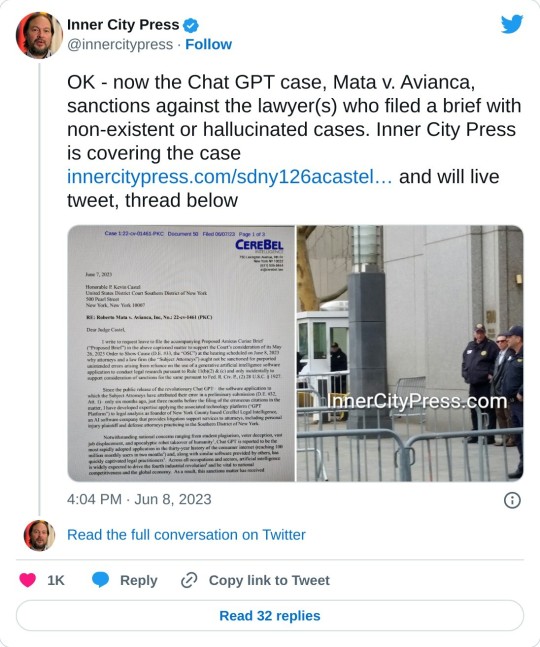
(Caveat: this thread was not an official transcript of the hearing and should not be taken as such. It is possible the actual events and statements made in the hearing differ significantly from this report - i.e., take this with a grain of salt and reserve final judgement for the actual transcript.)
I'll put the full thread with some (light) commentary below the cut.* But the overall impression I am left with is that the judge seems to feel this pair of attorneys are treating their duty of candor toward the tribunal with the same seriousness with which they are treating their duty of competence to their clients. (And in this case, that's a very bad thing.)
*The full thread except for a soon-to-follow part 2 because I ran out of space for images again.
(All of the following screenshots are from the above tweet thread by Inner City Press @ innercitypress on twitter, made on June 8, 2023.)

Normally I would overlook that "you, personally," but in this case, you really get the feeling that the judge is concerned that LoDuca might just start talking about what Schwartz did again.

Establishing LoDuca's base of knowledge - he should know how to look up cases and check if they are real; he should know what a real case looks like.

The March 1 submission was the plaintiff's opposition to the motion to dismiss, where they first cited the fake cases.
How bad this answer is depends, I think, on LoDuca's wording here. Best case scenario, his statement about Schwartz was a specific statement about what inquiry was reasonable for him to do under the circumstances (which - for that first filing - I think is actually a reasonable argument. You don't expect your colleague to just make up cases). Worst case, this reads like him trying to wiggle out of his obligations. I will withhold judgement until I see the official transcript.
Rule 11, by the way, refers to Rule 11 of the Federal Rules of Civil Procedure. Rule 11(b) states:
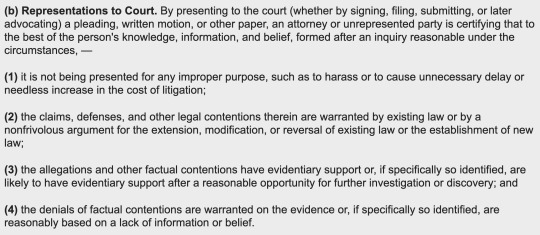
(If you remember the Order to Show Cause, we are dealing with a Rule 11(b)(2) issue here. Rule 11(c) allows the court to impose sanctions for violations of Rule 11(b))

Oh no, bad answer. (If anyone reading this is good at photoshop, I cannot express how badly I want a version of the "this sign can't stop me because I can't read" meme with the sign being the quote from defendant's reply where they say, "The undersigned has not been able to locate this case by caption or citation, nor any case bearing any resemblance to it.")

Oh that is not a good way of characterizing those orders. (Those were the orders, remember, where the Court said, "By April 18, 2022, Peter LoDuca, counsel of record for plaintiff, shall file an affidavit annexing copies of the following cases cited in his submission to this Court: as set forth herein. Failure to comply will result in dismissal of the action pursuant to Rule 41 (b), Fed. R. Civ. P.")

I would simply perish on the spot.

Oh yeah, I forgot to mention in my original attempted summary of "Varghese" - the first paragraph states that it is a wrongful death suit by the widow of the passenger. Then the second paragraph states that the passenger was denied boarding on a flight due to overbooking and thus missed his connecting flight and therefore incurred additional expenses. The case was such nonsense that I legitimately forgot about that inconsistency by the time I got to the end.

Your honor I plead "2 stupid 2 sanction."
(I believe the "different fonts" is in reference to the April 25 affidavit, in which the case names - and some of the surrounding text - are in a different font from most of the text in the affidavit. It seems like this is because they may have been copied straight from ChatGPT. See e.g., #3 below. It's hard to tell just based on this twitter thread, though.)


A short and simple answer! You did it!

"I have all the answers I need" is not a good sentence in this context.

Very genuinely: shorter is better here. At least I don't think he hurt himself with that statement.

Judge Castel: How do you conduct legal research?
Schwartz: I research cases.
Judge Castel: Do you read them?
Schwartz: Well, I may have once upon a time, but after hearing you ask that question in this context, I have decided to retire from the practice of law forever and also possibly sink into the ground and die. Also, by answering "yes," here, I just realized that I'm either admitting that I read the cases I submitted and therefore must have known they were fake, or else I just possibly committed perjury. Oh shit oh fuck.

Oh god I'm cringing myself into a pretzel just reading this.

Hey, by the way? You can actually use google (esp. google scholar) to do legal research. (It's not a good tool and you will miss things, but it will do in a pinch.) But. Um. If you know that...why didn't you double check your cases at very least on google when you were told they seemed to be made up?

So, once again, I am going to withhold judgement until I see the actual transcript. That said, if Schwartz did say this, I would like to compare it briefly to a part of the chat transcript he provided to the court. Here is the first question asked about the Montreal Convention in the provided transcript:

"analysis"

Oh god. I can't even provide commentary on this one. I hope this is worse than the actual transcript will prove to be. I'm reading through my fingers like I'm watching a horror movie.

"Misperception" (or "misconception") doesn't work once you have evidence that should cause you to doubt - like not being able to find a case that was supposedly published in the Federal fucking Reporter.
This is overshooting "2 stupid 2 sanction" into "too stupid to function."* You either looked for "Varghese" or you didn't. If you looked for "Varghese," it is not credible that you continued to have a good faith assumption that ChatGPT couldn't lie. If you didn't look up "Varghese," you just lied to the Court under oath.
*Just to be clear: for an ordinary person, this would be a very understandable lack of knowledge issue. A lawyer has no excuse not to know this.

Judge Castel: Mr. Schwartz, I think you have the fucking audacity to try to lie to me to my face in my fucking courtroom.

Honestly at this point I'm surprised he could still talk. I think screaming, "I'm melting, I'm melting!" as he vanished into steam, leaving his crumpled suit behind, would be an appropriate response.

NO.
Oh no, oh honey.
Ok. Two options here (again, assuming he actually fucking said "They said they couldn't find them," in response to the Court asking, "When Avianca said you cited non existent cases?"):
Schwartz is once again trying to purposefully downplay what the defendant's reply brief actually said and dodge responsibility.
Schwartz honestly, truly believes that when the defendant filed a reply containing the line, "The undersigned has not been able to locate this case by caption or citation, nor any case bearing any resemblance to it," they were just asking for assistance with their legal research?!??!
I honestly don't know which is worse.

Oh no....

Oh man, I haven't gone over it here yet, but I think that "I looked up the judge" is a panicked attempt at bringing up a talking point the Professional Responsibility Lawyers raised in their memorandum of law. (Again, I'm giving this reading of his response with the caveat that it is based only on this thread, not the official transcript, which might read very differently and contain different/more info.) The Professional Responsibility attorneys noted in a footnote that two of the judges listed in the "opinion," including the "author," were actual 11th circuit judges, and the other is an actual 5th circuit judge. My read of this footnote was as an extra little detail tossed in by the Professional Responsibility attorneys to try to dress up their argument that the "opinions" had various "indicia of authenticity."
But here's the problem. If Schwartz is telling the truth - if he was reading carefully and critically enough that he bothered to look up the judge (why would you do that if you didn't think the case might be fake?!) there is no way he could have missed that the case was gibberish. Again, if this is really what he said at the hearing, he either lied in the hearing, or he must have know the "opinions" were bogus when he gave them to LoDuca to file.

"Did it cross your mind" - if the court actually said this, oh my god.

Hey, that's the point that I made in my original post(s)!


This whole thing about the "+h" to "th" with the notary date is from the recent affidavits filed on 6/6/23, you can read them about them if you want, I'll be honest, I don't really care as much about the notary stuff so I'm going to skip it for the moment.
....and I've run out of space for images again. Part II to follow shortly!
1K notes
·
View notes
Text
Fit: take some fucking soap- YOU ATE SOAP? YOU DUMBASS
[Full transcript under cut]
Tubbo: Wait how come all your clothes are back to normal? Did you not get messed up in purgatory?
Fit: No I just changed dude
Tubbo: Oh, I'm lazy
Fit: It's called take a shower, lazy! Take a fucking shower holy shit!
Tubbo: I would never do such a thing
Fit: Hey, you're a father now. You need to- You know, take your personal hygiene seriously. You know what? Here, take some fucking soap, dirty. Take some fucking soap.
Tubbo: [walks into water] Let me just hop in here with the soap. [Eats the soap and gets poisoned] Ow! Ow! Oh god I ate it
Fit: You ate soap? You dumbass!
Tubbo: I ate it, I'm sorry!
500 notes
·
View notes
Text
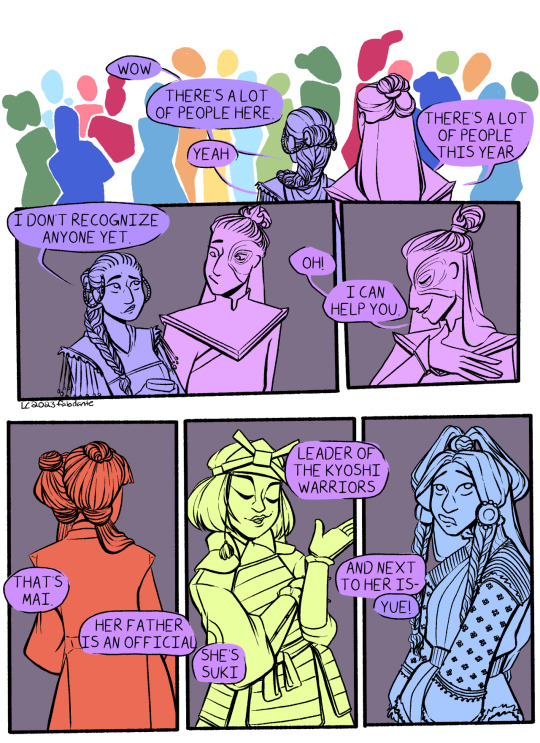
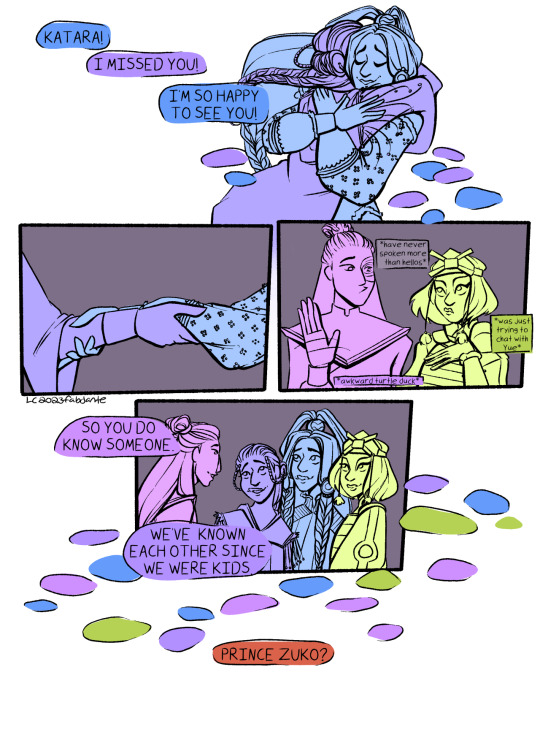
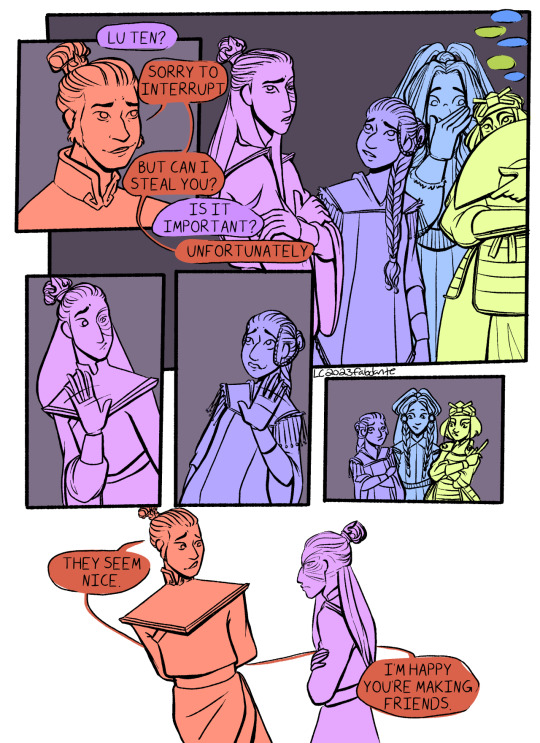
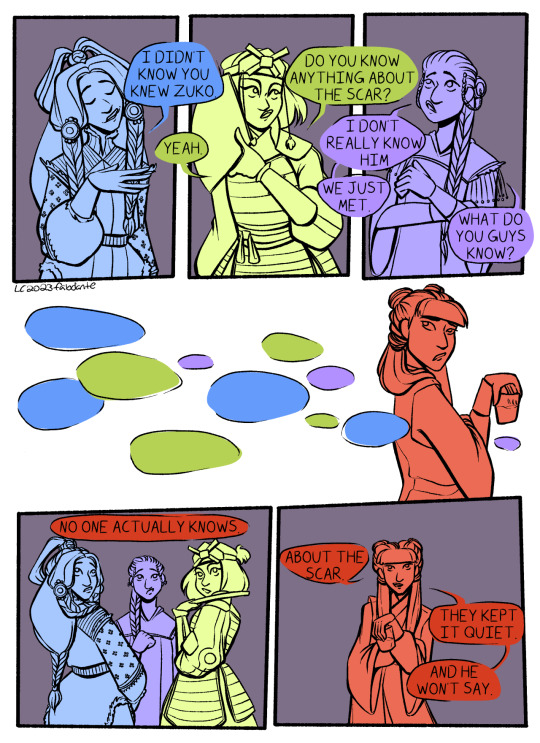
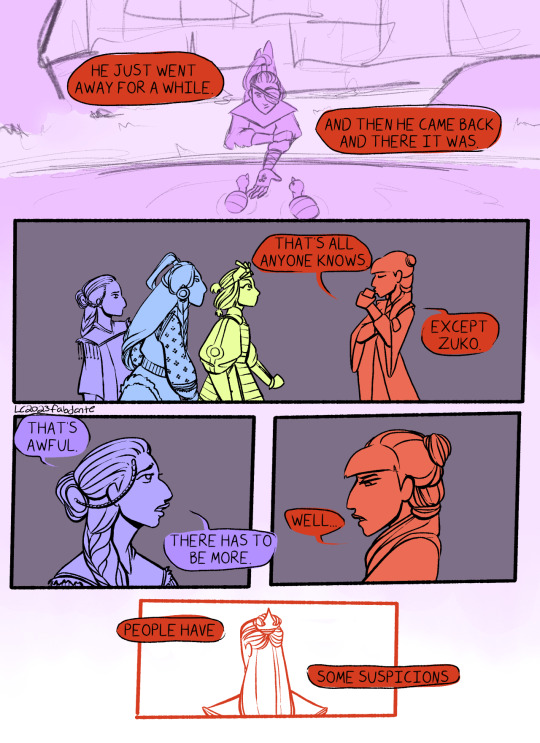
@zutaraweek day 3: union
a little follow up to this comic i did last year. i really liked the idea of union in a political context and this was a very round about way of that. like, a little tongue in cheek with all the different kids from different nations just sort of talking and gossiping together. teens doing teen stuff despite their high profile roles in society, that type of thing.
initially this comic was a lot more ambitious but some complications happened in my life which made me have to chip away at a lot of it. such as having it in full color, with backgrounds. there's been a lot of thought put into the world of the chief kya au, though! particularly related to yue that is not featured at all asdfghjk.
the more i worked on it, the more i got worried zuko might be a little ooc. but i was a bit inspired by crystal catacombs and the softness he had there. whenever i try to write him in this au, he's just usually just happy to be around katara so i'm just going to let him do what he wants.
Anyway, a transcript along with brief image descriptions is beneath the cut under my obligatory art links as well as in the alt text of the art!
art only blog - insta - inprnt - redbubble
Page 1: Zuko and Katara are at a gathering for those invited to the peace accords which seems to be more packed then usual.
Katara: Wow, there’s a lot of people here
Zuko: Yeah. There’s a lot of people this year.
K: I don’t recognize anyone yet.
Z: Oh! I can help you.
Z: That’s Mai. Her father is an official.
Z: She’s Suki. Leader of the Kyoshi Warriors.
Z: And next to her is-
K: Yue!
Page 2: Katara and Yue hug and the teens (Zuko, Yue, Katara, and Suki) all chat.
Yue: Katara!
K: I missed you!
Y: I’m so happy to see you!
have never spoken more than hellos
was just trying to chat with Yue
awkward turtle duck
Z: So you do know someone.
K: We’ve known each other since we were kids.
Lu Ten: Prince Zuko?
Page 3: Lu Ten appears, Yue and Suki gossip, and Katara's a bit sad as Zuko leaves with Lu Ten to handle business elsewhere.
Z: Lu Ten?
L: Sorry to interrupt, but can I steal you?
Z: Is it important?
L: Unfortunately.
L: They seem nice. I’m happy you’re making friends.
Page 4: The girls gossip and Mai overhears.
Y: I didn’t know you knew Zuko.
Suki: Yeah. Do you know anything about the scar?
K: I don’t really know him. We just met. What do you guys know?
Mai: No one actually knows.
M: About the scar. They kept it quiet.
Page 5: There's a small flashback to Zuko at 14 after receiving his scar, the girls continue to talk, and there's a final panel of Ozai, alluding to a family secret.
M: He just went away for a while. And then he came back and there it was.
M: That’s all anyone knows. Except Zuko.
K: That’s awful. There has to be more.
M: Well…people have some suspicions.
#zutara#zutara week#zutara week 2023#prince zuko#katara#zuko#atla#avatar#avatar the last airbender#my art
500 notes
·
View notes
Text

For @fordoweek day 2: armors and stories
(ID + textless variant under the cut)
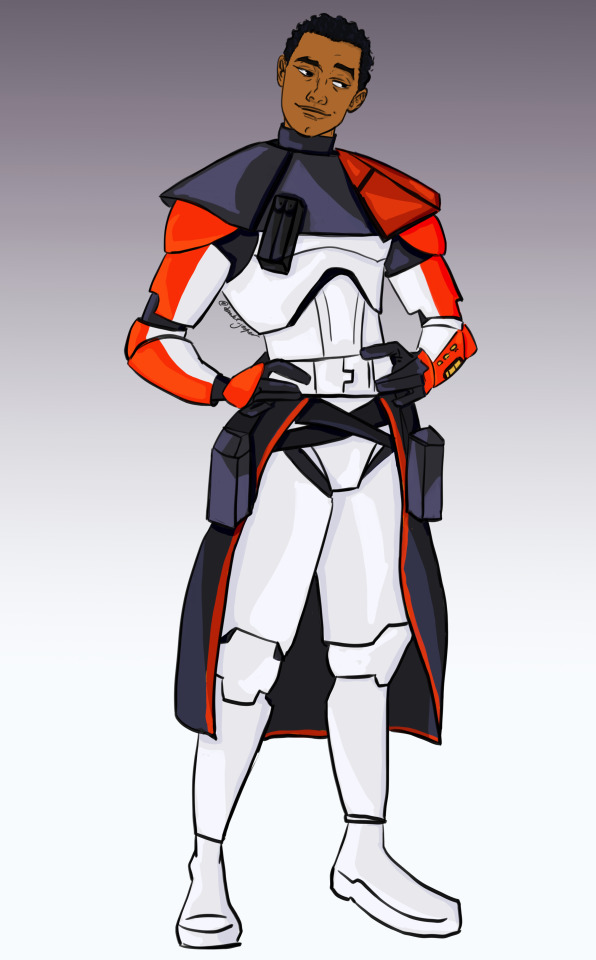
[ID 1: Fanart of Captain Fordo from the Star Wars franchise. He's in full armor, without his helmet. It's Phase I with a kama and an officer pauldron. There are info boxes pointing at specific armor parts. Transcription:
1: Unsanctioned paint color (formerly for captains. now only for him, apparently.);
2: Coruscant Guard officer pauldron (he "borrowed" Thire's);
3: 17's custom holsters that Fordo "found" on 17's bunk the ground;
4: Cody's (first and only) kama. Custom made: insulated, blast resistant, with beaded weights sewn in the bottom hem... and he "lost" it before his first mission!
5: Mysterious traces of orange paint.
End transcription. Infobox 5 points to a zoom in on the kama's hem, where orange paint can be seen under red paint. /END ID]
[ID 2: Fanart of Captain Fordo from the Star Wars franchise. He's in full armor, without his helmet. It's Phase I with a kama and an officer pauldron. It is the same picture as the one above but without info boxes. /END ID]
#cody never 'lost' his kama because he never wanted any. that's the story he's sticking to.#fordoweek2023#star wars#fordo#captain fordo#sw fanart#mine#my art
531 notes
·
View notes
Text
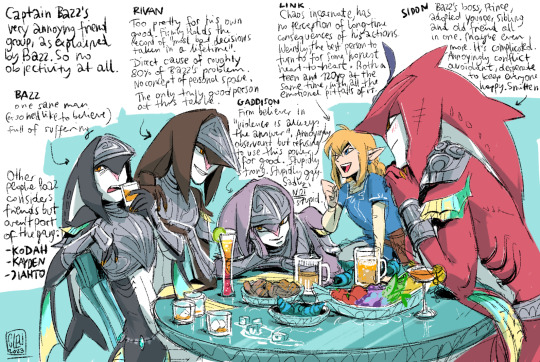
The reunion of Big Bad Bazz Brigade (and Sidon)
I wrote a few words about how each of them works in the group in this particular story. From Bazz's perspective though, so who's to say how truthful those observations are.
Typed transcript of my scribbles under the cut:
Captain Bazz's very annoying friend group, as explained by Bazz. So no objectivity at all.
Bazz: One sane man (or so he'd like to bielieve) Full of sufferig.
Rivan: Too pretty for his own good. Firmly holds the record of "most bad decisions taken in a lifetime". Direct cause of roughly 80% of Bazz's problems. No concept of personal space. The only truly good person at this table.
Gaddison: Firm believer in "violence is always the answer". Annoyingly observant but refusing to use this power for good. Stupidly strong. Stupidly gay. Sadly, -not- stupid.
Link: Chaos incarnate, no perception of long time consequences of his actions. Weirdly, the best person to turn to for some hones heart-to-heart. Both a teenager and a 120yo at the same time, with all the emotional pitfalls of it.
Sidon: Bazz's boss, Prince, adopted ypunger sibling (in a way) and old friend all at once. Maybe even more. It's complicated. Annoyingly confilict avoidant, desperate to keep everyone happy. Smitten.
Other people Bazz considers his friends, but aren't part of the gang: Kodah, Kayden, Jiahto
---
Of course I have so much more to say about every one of them, and the descriptions vary wildly, based on whose pov we choose to assume. They are all in some ways terrible and problematic, full of various traumas, but also friends who try to do their best. Such is life.
There also is a story behind all of it, obviously.
I don't know if I'll ever end up publishing the pages upon pages of comics I have about those guys, since it'd require loads of editing and rewrites, and i don't have this kind of time. But on the off chance I will, I want the personalities to be revealed in this way instead of big headcanon dumps. It's more fun this way.
#zora#sidon#big bad bazz brigade#bazz#botw#totk#loz#bazz botw#rivan#gaddison#link#i made them all terrible people in wildly different directions#but rivan is genuinly one good man in all of it#his penchant for making bad decisions makes it so he keeps being friends with them though#also i chose to showcase them at a party table instead of making a lineup to show off their characters a bit better. less boring this way
489 notes
·
View notes
Text
Gordon Cormier (Aang) and Ian Ousley (Sokka) answer a fan's question about whether there is a possibility of Zukka becoming a thing in future seasons of the show - Toronto Comicon, March 17 2024
transcript under the cut!
Fan: I am wondering in the future if there’s any hope for the Zukka shippers. I’m just putting it out there, wondering if that’s anything I should continue looking for.
Ian: I hear you. I hear you.
Host: You can't spoil it. Netflix has shooters, so.
Ian: That's probably true. Um, I - we haven't, we haven't read any scripts yet, so you can only hope, you know. Yeah, we have no control over that. And I don't know. So I'm right there with you.
Gordon: Are you guys talking about Zuko and Sokka, like Zukka?
Me, recording: Yeeees.
Gordon: Okay, well, I also haven't read any scripts. But I would like to say on behalf of the whole fan base and the whole cast, we are really excited to see what you guys might do with it if you do, because, I mean, I'm in full support. I think that they're a perfect fit.
Host: The charisma is there...
Gordon: Yeah, you guys are both…it'd be really cute, you know.
Host: Yeah. I'm currently writing fanfic about it right now, so, I gotchu.
Gordon, to fan: Thank you.
Ian: I hear you. Thanks.
#toronto comicon#natla cast#netflix atla#gordon cormier#ian ousley#zukka#sokka x zuko#zuko x sokka#my video#hot off the presses people!!!!#zukka nation rise up
234 notes
·
View notes
Text
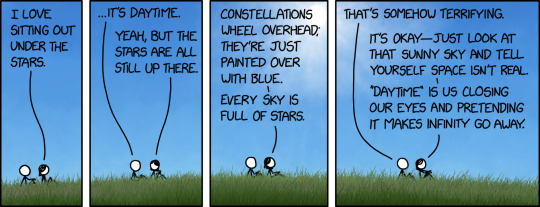
If you live in Los Angeles (around 33°52'N, roughly the latitude of Hermosa Beach) the black hole in V404 Cygni passes over you each day. On Christmas Day it will be directly overhead around 2pm.
Under the Stars [Explained]
Transcript Under the Cut
[Megan and Cueball are sitting in a field under a clear blue sky and bright Sun.]
Megan: I love sitting out under the stars.
Cueball: ...It's daytime.
Megan: Yeah, but the stars are all still up there.
Megan: Constellations wheel overhead; they're just painted over with blue.
Megan: Every sky is full of stars.
Cueball: That's somehow terrifying.
Megan: It's okay—just look at that sunny sky and tell yourself space isn't real.
Megan: "Daytime" is us closing our eyes and pretending it makes infinity go away.
739 notes
·
View notes